#that he brought all the disaster and misfortune down upon this family
Note
WWX IS SO RUDE THO???? Like his refusal to be formal with Wangji? But tbh what took the cake for me for the rudest, most dickiest (is that a word) moment was when he went to the Jiang Ancestral Hall? Like you- you left the sect, you aren’t a member of the family, you’re bringing some random dude in- like maybe I’ve been overreacting over the whole thing, but I think Jiang Cheng wasn’t at fault for reacting the way he did
you’re absolutely right, anon, and I hate to admit it because I (like everyone else who’s watched this show) love Wei Wuxian dearly
perhaps rude is a strong way of putting it; I would say he’s actively discourteous in his younger years, and when it’s him using Lan Wangji’s personal name without being given permission to do so, a charitable reading would be to say that Wei Wuxian’s showing his disregard for petty social courtesies that would ordinarily keep them at a safe and polite distance from each other, but also he like... doesn’t really respect Lan Wangji’s personal space. He’s very well-intentioned, and nothing terrible comes of it, but teenage Wei Wuxian does not understand consent.
and likewise with the Jiang Ancestral Hall -- it’s hard, because we as viewers know that Wei Wuxian still cares for the Jiang Clan like his own family, that he’s bringing Lan Wangji here with only the gravest and most solemn of purposes, but also like... dude. That’s an extremely private and hallowed space; it’s not somewhere that random visitors should just be walking into. Jiang Cheng barely let them into the reception hall; it probably would’ve been savvier to, y’know, not push your luck.
At the same time, you can see how much this moment means to Wei Wuxian, to be able to pay his respects to the people who gave him a chance and a home. Jiang Cheng is excessively aggressive in driving them out; each sentence is calculated to insult and hurt Wei Wuxian as much as possible, so much so that Wei Wuxian can’t even respond to defend himself, so much so that Lan Wangji steps in.
Everything about that conversation is pure, concentrated pain -- it’s Jiang Cheng, lashing out after years and years of mixed guilt and bitterness; it’s Wei Wuxian, being confronted with the consequences of his actions; it’s Lan Wangji, realizing how much of his own family Wei Wuxian sacrificed, both on purpose and accidentally. No one is purely innocent in this scene, and no one is purely at fault; it’s the accumulation of entire lifetimes of debts unpaid and resentments accumulated and harsh words unsaid, all coming out in one ugly, vicious fight.
#it also might be worth noticing#that Wei Wuxian is the one who makes the first move#he grabs Jiang Cheng by the collar#and Jiang Cheng doesn't move to defend himself#Wei Wuxian almost NEVER initiates a fight#so the fact that he does so here#points at the sheer level of his distress and guilt#the bittersweetness of coming home to a place that he exiled himsef from#the malingering guilt that what Madam Yu said was true#that he brought all the disaster and misfortune down upon this family#and the horrible vicious pain of his younger brother lashing out against him with words that aren't false#on top of his own golden core being turned unknowingly against him#we make fun of fainting Wei Wuxian but honestly#can you blame him#ask and ye shall receive#sadness#more sadness#Wei Wuxian#Lan Wangji#Jiang Cheng
396 notes
·
View notes
Text
Devotional Hours Within the Bible

by J.R. Miller
God's promise to Abraham (Genesis 14-15)
Lot had made a "good deal," as men say, in getting for his own such a rich section of the land. No doubt he congratulated himself on his fine fortune. We are not told whether he showed any gratitude toward Abraham, or whether he was one of those men who take all they can get, thanking neither God nor their fellow-man for any favor. There is need for cultivating a spirit of gratitude towards those who are kind to us and do things for us.
Soon, however. Lot found himself in trouble. He had pitched his tent in the neighborhood of Sodom, and one day there was great consternation in the valley when it was reported that King Chedorlaomer and his army were advancing over the hills with an irresistible force of warriors. The kings of the cities of the Plain were defeated in battle, their people were carried away as captives, and their goods as spoil. Among those taken captive, was Lot with his family and his possessions. Perhaps Lot began to see now, the mistake he had made. His misfortune had come through his worldly choice .
News of the disaster soon reached Abraham, in his safe place among the hills. Probably he would not have felt called upon to attempt the rescue of the people of Sodom; but when he heard that his nephew was taken captive, he assembled his men and pursued the enemy, and brought back Lot and his goods and also the people of Sodom who had been carried away.
Some men, after having been treated as Abraham had been by Lot, would not have felt called upon to do anything to rescue him - but Abraham, with his large-heartedness, instantly forgot Lot's selfishness toward him and treated him as a brother. We would say that Lot would be lavish in his gratitude to Abraham for rescuing him - but we have no record of a word of thanks from him. The king of Sodom showed his gratitude to Abraham for bringing back his people - but no mention is made of Lot coming to say how thankful he was. Men who do injustice to you or treat you unkindly - are the last to show gratitude to you for kindnesses you may do.
Abraham seems to have been afraid after his attack upon Chedorlaomer. He had been easily successful - but he knew that the men he had defeated would probably return to seek revenge.
He did not want to become embroiled with them. In this time, therefore, when he was afraid, God came to him to reassure and comfort him: "Fear not, Abram: I am your shield." He did not say He would prepare a shield for Abraham, He said He Himself would be his shield. We need never be afraid of any danger - if we are obeying God and living faithfully. He who would do us harm - must first smite down God who is our shield!
But there was something else that was causing anxiety to Abraham, besides the danger from the hordes of the mountains. A great promise had been given to him, the promise of an abounding posterity - but as yet he had no child! "O Lord Jehovah, what will You give me, seeing I go childless?" God comes now to comfort him in this great hunger of his heart.
It is interesting to notice the patience and kindness of the Lord in the way He sought now to encourage Abraham. "He brought him forth abroad, and said, Look now toward heaven." It is always a good thing to get people to look toward heaven. God likes to point us there, especially when we are discouraged, for He loves to be an encourager. There is always a bright outlook heavenward, however dark it may be on the earth. There always are stars shining there, though clouds may be all about us where we stand. Heaven is a place of hope. God is there, glory and home are there. We should train ourselves to look up and not down.
The heart follows the eyes, and if we accustom ourselves to keep our eyes toward the earth - we shall grow to care only for earthly things. But if we look up, our life will grow upward, our affections will be fixed on things above, and we shall have our treasure in heaven.
The stars became an object - lesson that night in the Lord's teaching, in helping Abraham to realize the numberlessness of his posterity in the future. "Number the stars, if you be able to number them. . so shall your seed be." Once before, God had given Abraham a similar promise, using then the dust under his feet as a measure of computation. Whenever he looked down at the ground he would think of God's promise and of the countless family that was assured to him. But now God gave him another sign. This time he pointed him to the heavens. His seed should be as the stars. The stars suggest radiancy, glory. He bade Abraham count them. Modern science makes this promise mean very much more than it did to Abraham. It is said that only five or six thousand stars are visible to the unaided eye - but with a modern telescope there are millions and millions - eighteen million stars, astronomers tell us, in the zone called the Milky Way alone. The promise, therefore, was far greater than Abraham himself knew.
Abraham's response to the Lord's assurance, shows a childlike trust. "He believed Jehovah: and he reckoned it to him for righteousness." The Hebrew word for believed is very strong. It means that Abraham reposed upon God's word of promise - as a child nestles in a mother's arms. It is a wonderful picture of faith. That is what faith in God should always be - a lying down in God's bosom, a resting upon God in deep confidence. There was no human reason for expecting that Abraham should have such a posterity. He was growing old and had no child. Yet God assured him that he should have a seed as countless as the stars, and Abraham believed God's word, without question. He would not perplex himself about the time or the way the promise would be fulfilled - but would simply rest upon God, lean upon Him, trust Him - and leave all to His loving wisdom. There was no more doubting on Abraham's part after this.
This is the kind of faith that pleases God. It is what Christ would have us exercise in Him. We cannot see Him - but we may trust Him, because He has assured us that if we believe in Him - He will save us, bless and use us, and bring us at last home to glory. He would have us repose upon His promises and trust our life, for time and for eternity, absolutely in His hands. Such faith is imputed for righteousness .
We need to think carefully of the importance of faith. In these days, the whole force of Christian teaching is toward activity. The followers of Christ are urged to be instant in season and out of season in the work of their Master. These are great missionary days. Christians are awaking as never before, to the duty of carrying the gospel to all lands, to every creature. Those who are taking no part in this work are not fulfilling their Lord's will and command. Young believers are taught to take up at once some work in the Church. It is here that all Christian teaching focuses.
And there is nothing amiss in thus putting the emphasis on service. We must show our faith - in our works. If we believe on Christ, we must devote ourselves without reserve to His service. If the world is to be won for Christ, everyone who is Christ's friend must do his part. Nevertheless it is important that we keep ever in mind, the truth that without faith it is impossible to please God, that we are justified by faith, that it is only through faith we are united to Christ and receive power for life and service. Abraham was simply to believe God - that was all. He had nothing whatever to do with the fulfillment of the promises. Nor have we. Faith links us to God - our littleness to His almightiness, and then He does the work - not He without us, certainly never we without Him - but He in us and through us. Let us get a fresh vision of the meaning and importance of faith. The greatest measure of work without faith - will accomplish nothing.
The Lord then said that His plan for Abraham's future would not fail. "I am the Lord who brought you out of Ur. .. to give you this land." God had had a plan for Abraham's life from the beginning. When He called him from his old heathen home, He had all his future in His thought. He intended then to give Canaan to his seed.
God has a plan for every life. There is something He wants each one of us to do, something He made us to do, a place we are born to fill. Paul puts this in a wonderful way when he says, "Those He foreknew, He also predestined to be conformed to the image of His Son. And those He predestined, He also called; and those He called, He also justified; and those He justified, He also glorified." God has a glorious plan for the life of every one He calls from sin. Those who, like Abraham, listen to His call and leave all to follow Him - at last receive the inheritance of eternal life. Those who despise the call and stay in their sins - miss all this glorious destiny which might have been theirs, which was offered to them and rejected.
Abraham asked for some token that the promise would be fulfilled. "How shall I know that I shall inherit it?" We all like to have tokens of love from our friends, though we never for one moment doubt their affection. When friends are called to separate for a time, they sometimes exchange gifts. A gift is not only a pledge, but is also a constant reminder, in absence, of the loved one who is ever faithful and true.
A young man was going abroad for a long journey, and when he was about to leave home his father gave him a watch, bearing upon the dial plate, the miniature pictures of both his parents. He asked his son to carry the watch on all his journey, and every time he looked at it he would think of the faithful, tender love at home. The young man would never have doubted this love, though he had carried no token of it; yet this pledge made the love seem more real and was a great comfort to him when far away from home. The Lord's Supper is a similar pledge from Christ to every Christian in this world. We do not doubt Christ's love for us - but this memorial feast makes the love seem more real and keeps it ever fresh in mind.
In answer to Abraham's request for some token - a vision was granted to him. The meaning of the vision is made clear. "Know this for certain: Your offspring will be strangers in a land that does not belong to them; they will be enslaved and oppressed 400 years. However, I will judge the nation they serve, and afterwards they will go out with many possessions. But you will go to your fathers in peace and be buried at a ripe old age. In the fourth generation they will return here." Abraham himself would not receive the fulfillment of the promise, nor his immediate descendants. But four generations later the promise would be realized. There would be dark days of toil and sorrow meanwhile - but beyond these dark days - bright days would come.
God's thoughts are long; He plans for long periods, for generations and ages future. Because a promise has not an immediate fulfillment, we are not to conclude that it has failed. Some of God's wheat grains are long in coming to harvest.
The same is often true of the Divine promises. They are long in being kept. There must be a time of preparation before fulfillment can come. We do not know what we must suffer and endure - before the spiritual beauty of which we dream when we consecrate ourselves to God, can be realized in us. We are only part, too, of a great company of believers who are to work in the bringing in of the kingdom. Our portion may be small, only a tear or two, only a word spoken for the Master, only a short day of service - and then death. It would take generations, the Lord told Abraham, to make ready for the occupancy of the promised land. Let us learn to believe - and to wait .
We do not live for ourselves nor for our own age alone; we live for those who will come after us, even generations hence. We may be only foundation layers - and may never see the superstructure rising. But no matter. If we can make a good beginning, which after we are gone shall grow to nobleness, will not the honor of the work be ours? Indeed, those whom the world honors most highly today - are the men who themselves did not see completed the great things they began. This was true of Abraham, of Moses, of John the Baptist, of Luther, of Calvin. They wrought in faith, receiving not the promise themselves - but only laying foundations for after generations to build upon, sowing seed for future harvests.
The faith of Abraham was sorely tried by the long waiting before Isaac was born. The promise was repeated again and again - but still its fulfillment was delayed. Sarah seems to have lost faith altogether when she gave her maid, Hagar, to Abraham to be his wife. It is instructive to note the consequences of this foolish and unbelieving resort. Only think how different the history of the world might have been through the long centuries - if Ishmael had not been born. From him came the vast Arab tribes which swarm over the East, claiming Abraham as their father, and the promises made to him as their inheritance. The Mohammedans are Ishmael's descendants, and when we think of their vast numbers, their hatred of Christianity, their bloody wars and persecutions, and all their opposition to the world's true progress - we see something of the evil that has come from Sarah's unbelief!
The lesson for us is, never to doubt God's promise, however long its fulfillment may be delayed, and never to resort to any schemes or devices of our own - to hasten a Divine purpose. Sarah's trouble was that she could not wait. Then she thought she would help God .
A little girl had been out quite a while. When she came in at length her mother asked her where she had been. "In the garden, mother." "What were you doing in the garden, my dear?" "I was helping God," the child replied. She explained that she had found a rose almost blossomed, and had blossomed it. But she had only ruined the rose. There are many people who try in the same way to help God, and try by schemes of their own to hasten the results they are expecting. The consequences to the world in the case of Sarah's impatient and unbelieving interference with God's way - show us the peril of taking our affairs out of God's hands into our own. We must trust and wait. We may trust, too, without doubting, for God's word never can fail. We may wait, for God's time is always the right time.
Abraham is called the friend of God. Once God speaks of him as "Abraham, My friend." We have in our Bible chapters a beautiful illustration of God's friendship for Abraham. It was just before the coming of the terrible judgment on Sodom, and God tells Abraham what He is about to do, giving the reason why He thus confides in him.
"The Lord said, Shall I hide from Abraham this thing which I do?" The language is human. God is represented as a man reasoning with Himself as to what He should do. We see in this verse, a wonderful revealing of the Divine heart. We think of a man who has a great project about to be wrought out. Thus far he has carried the secret in his own heart, telling it to no one. But he has a friend, one he loves very much, to whom he confides everything, from whom he conceals nothing. One day he says, "I feel like telling my friend about this important thing which I am purposing and planning to do. I love him and trust him, and he loves and trusts me. To keep from him the knowledge of my purpose - is not consistent with my love for him." That is the way God is represented here as speaking with Himself about Abraham. He puts the highest honor upon him. But that is just the glory of the Divine grace - its wondrous condescension. Abraham is lifted up by this Divine act - to a sharing of the very innermost counsels of God's heart. God dealt with him as a man deals with his most intimate, confidential friend.
In one of the Psalms we read, "The friendship of the Lord is with those who fear Him, and He will show them His covenant." We have the same truth taught in our Lord's words to His disciples, when He says, "No longer do I call you servants ; for the servant knows not what his Lord does: but I have called you friends ; for all things that I have heard from My Father - I have made known unto you." God is ever ready to disclose to us - the secrets of His love. But we must be near to Him to enjoy this privilege. It was to John who lay upon His bosom, that Jesus revealed the innermost things of His heart. Peter, sitting farther off at the table, when he wished to learn something from his Master, beckoned to John - and John whispered the question in the Lord's ear, and got the answer.
Those who live near to Christ's heart - have closer intimacy with Him than those who stay on the outskirts of the disciple household. We cannot dwell remote from Christ, in spirit, in feeling, in character, in service - and learn the sweetest things. He tells us that He will manifest Himself to those who love Him. "If any man loves Me - he will keep My word; and My Father will love him, and we will come unto him and make our abode with him." Therefore it is to those who love Christ and do His will - that He will make known the secret confidences of His heart.
The first reason God gives for His intimacy with Abraham and His revealing of His will to him - is that Abraham holds in his hands such great blessing for the future. The Divine purpose was to have a people trained as a holy seed, to whom He would commit the ordinances of true religion. Out of this nation the Messiah in due time would come. Abraham was chosen as the father of this new people. The divine plan for his life was very clearly marked out. He would become a great and mighty nation, and through him rich blessing would descend to all coming generations.
We cannot all be Abrahams. Not often does God want a man to start a new nation. But even for the lowliest life, He has a definite purpose. There is a place He would have us fill, a work He would have us do. If we are only faithful in the lot to which God assigns us, that is all He asks of us. It is a great thing to be what God made and designed us to be, though it be only to fill the obscurest place in the world.
Some people fail God. He requires them to do a certain work for Him, and they do not do it. It is a serious thought that something of God's plan in the blessing of the world is in the hands of each one of us, depends upon our being faithful. What a motive this gives for being loyal to God and true to our trust! It will be a sad thing if we disappoint God, or if the interests of His kingdom which He puts into our hands suffer through our negligence or sinfulness.
For example, to every father and mother - God entrusts the training of their children for Him. If they are unfaithful and their children's lives are marred or come to nothing beautiful, they have failed God in their place.
It was a great distinction that was put upon Abraham in the purpose of God for him - that "all the nations of the earth shall be blessed in him." We know how this was fulfilled. The Hebrew people, with all their faults and failings, carried blessing into all the old world. The fulfillment is yet going on in the Christian Church, in which the blessing of Abraham is still flowing through the earth. Abraham was faithful, and did not fail God. The Divine purpose was carried out in his life. All the nations of the world have been blessed in him. No other man has ever had the honor that was Abraham's, of becoming the father of nations, carrying in his faithfulness, that which has blessed all the earth. But in our measure, everyone of us may be a blessing, if not to all nations, certainly to many people .
We should seek to live - so that others will be blessed in us. The secret lies in fulfilling the plan and purpose of God in our lives. We can do this only by entire self-effacement. We cannot live for ourselves, and also bless the world. "He saved others; Himself He cannot save," though spoken in mockery by the enemies of Christ, is a truth which lies at the basis of every life that blesses others. We cannot live selfishly - and then be a blessing to others.
Abraham had approved himself to God, by his faithfulness. God had trusted him - and Abraham had not failed him. "For I have known him, to the end that he may command his children and his household after him." For God to know one is more than for us to know a person. His knowledge is fore-knowledge and choice, and the knowing of the heart, which takes the person into covenant relations. His knowing, choosing, and calling of Abraham were "to the end that he may command his children and his household after him." His mission was not completed when he had lived his own life faithfully and earnestly. He was also to train his family aright, so as to set their feet in the paths of God's purposes.
Many otherwise worthy men fail just here. They are good and saintly themselves, but they do not command their households after them in the way of the Divine law. Thus it was that Eli failed. He was a holy and saintly man in his own life - but he failed to restrain his sons from evil ways. Thus the good of his life ended in a measure, with himself. To make our life complete - we must see to it that those who are given to us to teach and to train, shall receive from us the good which has been entrusted to us for keeping and for transmission to posterity. Fathers and mothers are God's messengers to perpetuate the blessings of His grace in the world. It is not enough for them to love God themselves; they must see that their children are also taught to love God and do His will. Few things are sadder in life - than the home where the parents are godly - but where the children, through lack of early training and teaching, drift into the world!
We speak much of the responsibility of parents for children. It is very great. But there is also a responsibility of children for parents. "That they may keep the way of the Lord and do righteousness and justice, to the end that the Lord may bring upon Abraham that which He has spoken to him." First, Abraham was responsible for the commanding of his children after him in the ways of God. If he had been negligent or remiss, and they had failed to be faithful, he would have been to blame for the failure. Next, his children must keep the ways of the Lord, "to the end that the Lord may bring upon Abraham that which He has spoken of him." That is, God's promises to Abraham regarding the future could not be fulfilled unless his children were faithful to their part in the Lord's plan. Many a child wrecks and destroys all the good that a godly parent has built up in this world.
We are thus responsible in a measure, for the success of those who have gone before us. Without us, the things they have begun cannot go on to completion. Every true man begins many things which he cannot complete in his short life, the carrying forward of which must be left to other hands. A teacher's faithful work can come to its full fruitage - only through the diligence and earnestness of his pupils. A preacher's work can prove effectual and enduring - only through the continued faithfulness in living and doing of those who attend upon his ministry.
Even in business the same is true. A man founds some large enterprise, building it with his own hands to great proportions, and then leaves it to his sons. Its future and final outcome is dependent upon the wisdom and fidelity of those who come after him.
The Word of God has many promises for godly parents who bring up their families in the ways of holiness and righteousness; but their children have it in their power to hinder the coming of the promised blessings. Only by keeping God's commandments, can they secure the carrying out of the Divine purposes and plans which began with their parents. Any child has it in his power to bring failure upon all that his father has lived, suffered, and sacrificed to establish. Thus children carry in their hands - the final and complete success of the lives of their parents.
God still speaks after the manner of men. He is going down to see the true state of things in Sodom. "The outcry against Sodom and Gomorrah is so great and their sin so grievous that I will go down and see if what they have done is as bad as the outcry that has reached Me." God never punishes without faithful inquiry into the facts of the case. We are not always so careful to know the facts - before we judge. We too often form our opinions after hearing only one side. We judge from what others have told us, sometimes from mere gossip, or from appearances. We condemn without knowing all the facts. Indeed, there seems to be in human nature a quality most un-Christ like which is eager to seize upon the smallest reasons for condemning or criticizing others! Ofttimes things that seem to be wrong in others, if only we knew all the circumstances, would appear most trivial matters or even really good and beautiful things.
A young man who made a fair salary seemed to his fellow clerks in the bank, to be very stingy and pinching. He stinted himself in his own living, boarding and dressing in an economical way that seemed quite unnecessary for one who had his income. He avoided all the social expenditures in which his friends freely indulged.
But the truth about him was that he had an only sister, who lived some hundreds of miles away, an invalid, who was entirely dependent upon him for everything - as they were orphans. This was the secret of the economy and closeness in personal expenditure which his friends condemned - he was caring for his sister! He pinched himself - that he might send delicacies and comforts to her. If his companions had known all the facts - they would have honored his faithfulness and not have called it miserliness. Thus they misjudged him because they did not know all the facts. Life is full of illustrations of the same mistake in judging. We are apt to blame or condemn from only partial knowledge. Thus we are constantly doing injustice to others.
We may take a lesson from the Divine example in this case of Sodom. Of course the Lord knew the precise moral condition of these cities without making an investigation, for His eyes see into all hearts, and He knows not only acts but the reasons for them and the springs and motives from which they flow. But the representation we have here, is after the manner of men, to make it plain and clear to all, that the Lord is always just, never inflicting penalty when it should not be inflicted. Thus men were taught not to doubt the Divine justice in any case.
#Devotional Hours Within the Bible#God's promise to Abraham#Genesis 14-15#J.R. Miller#January 8#2022
12 notes
·
View notes
Text
Anonymous asked: I really enjoyed your book review of Sebastian Junger’s Homecoming. Perhaps enjoyment isn’t the right word because it brought home some hard truths. Your book review really helped me understand my older brother better when I think back on how he came home from the war in Afghanistan after serving with the Paras and had medals pinned up the yin yang. It was hard on everyone in the family, especially for him and his wife and young kids. He has found it hard going. Thanks for sharing your own thoughts as a combat veteran from that war. Even if you’re a toff you don’t come across as a typical Oxbridge poncey Rupert! As you’re a classicist and historian how did ancient soldiers deal with PTSD? Did the Greeks and Roman soldiers even suffer from it like our fighting boys and girls do? Is PTSD just a modern thing?
Part 1 of 2 (see following post)
Because this is subject very close to my heart as a combat veteran I thought very long and hard about the issues you raised. I decided to answer this question in two posts.
This is Part 1 and Part 2 is the next post.
My apologies for the length but this is subject that deserves full careful consideration.
Thank you for your lovely words and I especially find its heart warming if they touched you. I appreciate you for sharing something of the experience your ex-Para brother went through in coming home from war. I have every respect for the Parachute regiment as one of the world’s premier fighting force.

Working alongside them on missions out in Afghanistan I could see their reputation as the ‘brain shit’ of the British Army was well deserved. They’re most uncouth, sweary, and smelliest group of yobbos I’ve ever had the awful misfortune to meet. I’m kidding. The mutual respect and the ribbing went hand in hand. I doff my smurf hat to the cherry berries as ‘propah soldiers’ as they liked to say especially when they cast a glance over at the other elite regiments like HCav and the guards regiments.

Don’t worry I’ve been called a lot worse! But I am grateful you don’t lump me with the other ‘poncey’ officers. Not sure what a female Rupert is called. The fact that I was never accused of being one by any of those I served with is perhaps something I take some measure of pride. There are not as many real toff officers these days compared to the past but there are a fair few Ruperts who are clueless in leading men under their charge. I knew one or two and frankly I’m embarrassed for them and the men under their charge.
I don’t know when the term PTSD was first used in any official way. My older sister who is a doctor - specialising in neurology and all round brain box and is currently working on the front lines in the NHS wards fighting Covid alongside all our amazing NHS nurses and doctors - took time out one evening to have a discussion with me about these issues. I also talked to one or two other friends in the psychiatric field too. In consensus they agree it was around 1980 when the term PTSD came into usage. Specifically it was the third edition of the Diagnostic and Statistical Manual of Mental Disorders (DSM-lll) published by the American Psychiatric Association in 1980 partly because as a result of the ongoing treatment of veterans from the Vietnam War. In the modern mind, PTSD is more associated with the legacy of the Vietnam War disaster.
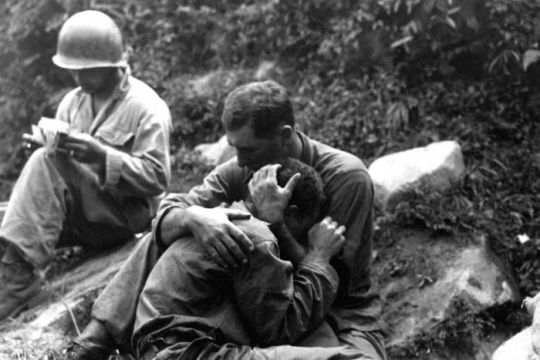
The importance of whether PTSD affected the ancient Greeks and Romans lies in the larger historical question of to what extent we can apply modern experience to unlock or interpret the past. In the period since PTSD was officially recognised, scholars and psychologists have noted its symptoms in descriptions of the veterans of past conflicts. It has become increasingly common in books and novels as well as articles to assume the direct relevance of present-day psychology to the reactions of those who experienced violent events in the historical past. In popular culture, especially television and film dramas, claims for the historical pedigree of PTSD are now often provided as background to the modern story, without attribution. Indeed we just take it as a given that soldier-warriors in the past suffered the same and in the same way as their modern day counterparts. We are used to the West to map the classical world upon the present but whether we can so easily map the modern world back upon the Greeks and Romans is a doubtful proposition when it comes to discussing PTSD.
Simply put, there is no definitive evidence for the existence of PTSD in the ancient world existed, and relies instead upon the assumption that either the Greeks or Romans, because they were exposed to combat so often, must have suffered psychological trauma.
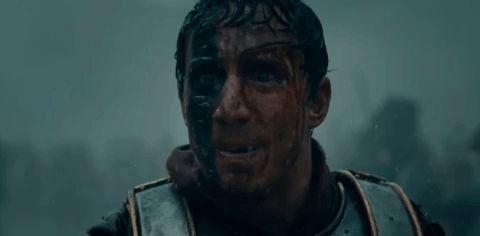
There are two schools of thought regarding the possibility of PTSD featuring in the Greco-Roman world (and indeed the wider ancient world stretching back into pre-history, myth and legend) – universalism and relativism. Put simply, the universalists argue that we all carry the same ‘wetware’ in our heads, since the human brain probably hasn’t developed in evolutionary terms in the eye blink that is the two thousand years or so since the Greco-Roman Classical era. If we’re subject to PTSD now, they posit, then the Greeks and the Romans must have been equally vulnerable. The relativists, on the other hand, argue that the circumstances under which the individual has received their life conditioning – the experiences which programme the highly individual software running that identical ‘wetware’, if you will – is of critical importance to an individual’s capacity to absorb the undoubted horrors of any battlefield, ancient or modern.
Whichever school one falls down on the side of is that what seems to happen in any serious discussion of the issue of PTSD in the ancient world is to either infer it indirectly from culture (primarily, literature and poetry) or infer it from a comparative historical understanding of ancient warfare. Because the direct evidence is so scant we can only ever infer or deduce but can never be certain. So we can read into it whenever we wish.
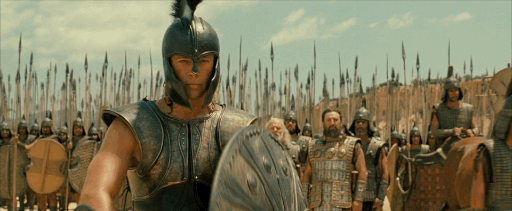
In Greek antiquity we have of course The Illiad and the Odyssey as one of the most cited examples when we look at the character traits of both Achilles and Odysseus. From Greek tragedy those who think PTSD can be inferred often point to Sophocles’s Ajax and Euripide’s Heracles. Or they look to Aeschylus and The Oresteia. I personally think this is an over stretch. Greek writers do; the return from war was a revisited theme in tragedy and is the subject of the Odyssey and the Cyclic Nostoi.
The Greeks didn’t leave us much to ponder further. But, with rare exceptions, the works from Graeco-Roman antiquity do not discuss the mental state of those who had fought. There is silence about the interior world of the fighting man at war’s end. So we are led to ponder the question why the silence?
This silence also echoes into the Roman period of literature and history too. Indeed when we turn to the Roman world, descriptions of veterans are rare in the writings that survive from the Roman world and occur most often in fiction.
In the first poem of Ovid’s Heroides, the poet writes about a returned soldier tracing a map upon a table (Ov. Her. 1.31–5):
...upon the tabletop that has been set someone shows the fierce battles, and paints all Troy with a slender line of pure wine:
‘Here the Simois flowed; this is the Sigeian territory,
here stood the lofty palace of old Priam, there the tent of Achilles...’
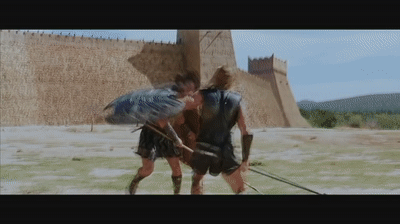
This scene provides an intimate glimpse of what it must have been like when a veteran returned home and told stories of his campaigns: the memories of battle brought to the meal, the crimson trail of the wine offering a rough outline of the places and battlefields he had experienced. The military characters in poems and plays show a world in which soldiers are ubiquitous, if somewhat annoying to the civilians. Plautus, for instance, in his Miles Gloriosus, portrays an officer boasting about his made-up conquests – the model for the braggart in A Funny Thing Happened on the Way to the Forum – and Juvenal complains about a centurion who stomps on his sandalled foot in the bustling Roman street.
Despite this silence, compelling works have been written that interweave vivid modern accounts of combat and its aftermath with quotes from ancient prose and poetry. At their best, these comparisons can illuminate both worlds, but at other times the concerns of the present-day author are imposed on the ancient material. But the question remains are such approaches truthful and valid in understanding PTSD in the ancient world?

So if arts and literature don’t really tell us much what about comparative examples drawn from military history itself?
Here again we are in left disappointed.
According to the Greek historian, Herodotus, in 480 B.C., at the Battle of Thermopylae, where King Leonidas and 300 Spartans took on Xerxes I and 100,000-150,000 Persian troops, two of the Spartan soldiers, Aristodemos and another named Eurytos, reported that they were suffering from an “acute inflammation of the eyes,”...Labeled tresantes, meaning “trembler,”. It is that Aristodemos later hung himself in shame. Another Spartan commander was forced to dismiss several of his troops in the Battle of Thermopylae Pass in 480 B.C, “They had no heart for the fight and were unwilling to take their share of the danger.”
Herodotus again in writing about the battle of Marathon in 490 B.C., cites an Athenian warrior who went permanently blind when the soldier standing next to him was killed, although the blinded soldier “was wounded in no part of his body.” Interestingly enough, blindness, deafness, and paralysis, among other conditions, are common forms of “conversion reactions” experienced and well-documented among soldiers today
Outside the fictional world, Roman military history tell us very little.
Appian of Alexandria (c. 95? – c. AD 165) described a legion veteran called Cestius Macedonicus who, when his town was under threat of capture by (the Emperor-to-be) Octavian, set fire to his house and burned himself within it. Plutarch’s Life of Marius speaks of Caius Marius’ behaviour who, when he found himself under severe stress towards the end of his life, suffering from night terrors, harassing dreams, excessive drinking and flashbacks to previous battles. These examples are just a few instances which seem to demonstrate that PTSD, or culturally similar phenomena, may be as old as warfare itself. But it’s worth stressing it is not definitive, just conjecture.
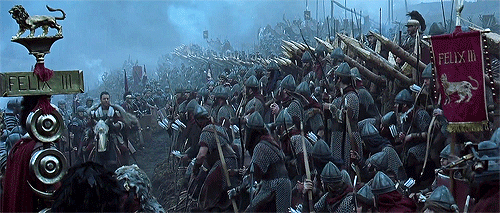
Of course of accounts of wars and battles were copiously written but not the hard bloody experience of the soldier. Indeed the Roman military man is described almost exclusively as a commander or in battle. Men such as Caesar who experienced war and wrote about it do not to tell us about homecoming.
It seems one of main challenges when we try to see military history through the lens of our definition of PTSD is to first understand the comparative nature of military history and what it is we are comparing ie mistaking apples for oranges.
The origin of military history was tied to the idea that if one understood ancient battle, one might fight and, more importantly, one might lead and strategise more effectively. In essence, much of the training of officers – even in the military handbooks of the Greeks and Romans – was an attempt to keep new commanders from making the same mistakes as the commanders of old. Military history is intended to be a pragmatic enterprise; in pursuit of this pragmatic goal, it has long been the norm to use comparative materials to understand the nature of ancient battle.
The 19th Century French military theorist Ardant du Picq argued for the continuity of human behaviour and assumed that the reactions of men under the threat of lethal force would be identical over the centuries: “Man does not enter battle to fight, but for victory. He does everything that he can to avoid the first and obtain the second....Now, man has a horror of death. In the bravest, a great sense of duty, which they alone are capable of understanding and living up to, is paramount. But the mass always cowers at sight of the phantom, death. Discipline is for the purpose of dominating that horror by a still greater horror, that of punishment or disgrace. But there always comes an instant when natural horror gets an upper hand over discipline, and the fighter flees”
These words offer insight to those of us who have never faced the terror of battle but at the same time assume the universality of how combat is experienced, despite changes in psychological expectations and weaponry, to name but two variables.
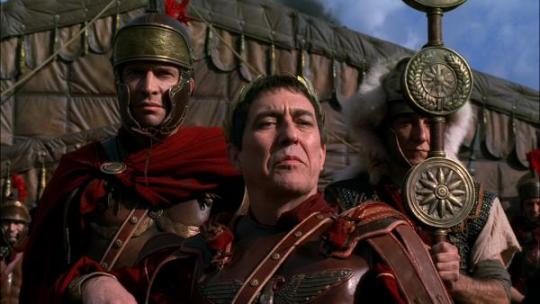
Another incentive for scholars and researchers is to turn to comparative material has been the growing awareness of the artificiality of how we describe war. A mere phrase such as ‘flank attack’ does not capture the bloody, grinding human struggle. Roman authors – especially those who had not fought – often wrote generic descriptions of battle. Literary battle can distort and simplify even as it tells, but if the main things are right – who won, who lost, and who the good guys are – the important ‘facts’ are covered. Even if one intends to speak the truth about battle, the assumptions and the normative language used to describe violence will affect the telling. We may note that the battle accounts in poetry become increasingly grisly during the course of the Roman Empire (perhaps owing to the growing popularity of gladiatorial games),while, in Caesar’s Gallic War, the Latin word cruor (blood) never appears and sanguis (another Latin word for blood) only appears in quoted appeals (Caes. B. Gall. 7.20, in the mouth of Vercingetorix, and 7.50, where the centurion M. Petronius urges his men to retreat). The realities of the battlefield are described in anodyne shorthand. In much the same way that the news rarely prints or televises graphic images, Caesar does not use gore, and perhaps for the same reason – to give a sense of reportorial objectivity.

Another element in the interpretive scrum is a given author’s goal in writing an account in the first place: Caesar, for example, was writing about himself, and he may have been producing something akin to a political campaign ad. Caesar makes Caesar look great and there is reason to believe that, if he was not precisely cooking the books, he did give them a little rinse to make him look more pristine. Given the many factors that complicate our ability to ‘unpack’ battle narratives, Philip Sabin has argued that the ambiguity and unreliability of the ancient sources must be supplemented by looking at the “form of the overall characteristics of Roman infantry in mortal combat”. Again the modern is used to illuminate that which is obscured by written accounts and the “the enduring psychological strains” are merely unconsciously assumed.
These legitimate uses of comparative materials have led to a sort of creep: because military historians have used observations of how men react to combat stress during battle to indicate continuity of behaviour through time, there appears to be a consequent expectation that men will also react identically after battle. This creep became a lusty stride with modern books written about the ancient world and PTSD.
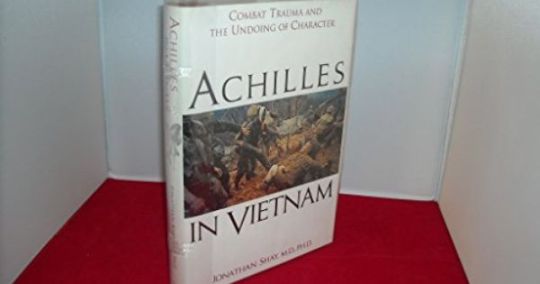
After I finished my tour in Afghanistan I read many books recommended to me by family and friends as well as comrades. One of these books is well known in military circles - at least amongst the thinking officer class - as an iconic work of marrying the ancient world and the modern experience of war. I read it and I was touched deeply by this brilliant therapeutic book. It was only months later I began to re-think whether it was a true account of PTSD in the ancient world.
This insightful book is called Achilles in Vietnam by Jonathan Shay. Shay is psychiatrist in Boston, USA. He began reading The Iliad with Vietnam veterans whom he was treating. Achilles in Vietnam, is a deeply humane work and is very much concerned with promoting policies that he hoped would help diminish the frequency of post-traumatic stress. His goal was not to explain ancient poetry but to use it therapeutically by linking his patients’ pain to that of the Iliad’s great hero. His book offers a conduit between the reader and the experiences of the men that Shay counsels. In the introduction to this work he makes a nod to Homerists while also asserting the primacy of his own reading:
“I shall present the Iliad as the tragedy of Achilles. I will not glorify Vietnam combat veterans by linking them to a prestigious ‘classic’ nor attempt to justify study of the Iliad by making it sexy, exciting, modern or ‘relevant’. I respect the work of classical scholars and could not have done my work without them. Homer’s poem does not mean whatever I want it to mean. However, having honored the boundaries of meaning that scholars have pointed out, I can confidently tell you that my reading of the Iliad as an account of men in war is not a ‘meditation’ that is only tenuously rooted in the text. “
After outlining the major plot points around which he will organise his argument, he notes, “ ‘This is the story of Achilles in the Iliad, not some metaphorical translation of it”.
The trouble was and continues to be is that many in the historical and medical fields began to rush to unfounded conclusions that Shay, on the issue of PTSD in the ancient world, had demonstrated that the psychological realities of western warfare were universal and enduring. More books on similar comparative themes soon emerged and began to enshrine the truth that PTSD was indeed prevalent throughout the ancient world and one could draw comparative lessons from it.
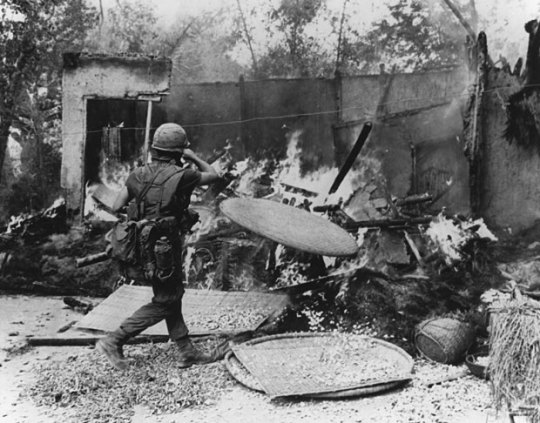
Perhaps one of the most influential books after Shay was by Lawrence Tritle. Tritle, a veteran himself, wrote From Melos to My Lai. It’s a fascinating book to read and there are parts that certainly resonate with my own experiences and those of others I have known. In the book Tritle drew a direct parallel between the experiences of the ancient Greeks and those of modern veterans. For instance, Xenophon, in his military autobiography, presents a brief eulogy for one of his fallen commanders, Clearchus. Xenophon writes that Clearchus was ‘polemikos kai philopolemos eschatos’ (Xen. An. 2.6) – ‘warlike and a lover of war to the highest degree’.
Tritle comments:
“The question that arises is why men like Clearchus and his counterparts in Vietnam and the Western Front became so entranced with violence. The answer is to be found in the natural ‘high’ that violence induces in those exposed to it, and in the PTSD that follows this exposure. Such a modern interpretation in Clearchus’ case might seem forced, but there seems little reason to doubt that Xenophon in fact provides us with the first known historical case of PTSD in the western literary tradition.”
Arguably in the West and especially our current modern Western culture is predicated at baulking at the notion of being ‘war lovers” as immoral. But such an interpretation speaks more of our modern Christianised ambivalence towards war; to the Spartans and Athenians the term would not have had a negative connotation. ‘Philopolemos’ is, in fact, a compliment, and the list of Clearchus’ military exploits functions as a eulogy. There are points where his analysis does not adequately address the divergences between ancient and modern experiences.

For all the talk of our Western culture being rooted in Ancient Greece and Rome we are not shaped by the same ethics. Our modern ethics and our moral code is Christian. There is no such thing as a secular humanist or atheist both owe a debt to Christianity for the way they have come to be; in many respects it’s more accurate to describe such people as Christianised Humanists or Christian Atheists even if they reject the theological tenets of the religious faith because they use Christian morality as the foundation to construct their own. Many forget just how brutal these ancient societies were in every day life to the point there would be little one could find recognisable within our own modern lives.
Now we come to third point I wish to make in determining where the Greeks or Romans actually experienced PTSD. This is to do with the little understood nature of PTSD itself. As much as we know about PTSD there is still much more we don’t know. Indeed one of the most problematic and complicated issues is the continued disagreement around the diagnosis and specific triggers of the disorder which remain little understood. We have to admit there are competing theories about what causes PTSD but, in terms of experiences that make it manifest, there are essentially three possible triggers: witnessing horrific events and/or being in mortal danger and/or the act of killing – especially close kills where the reality of one’s responsibility cannot be doubted. The last of these was strongly argued in another scholarly book by D. Grossman, On Killing, the Psychological Cost of Learning to Kill in War and Society (1995).
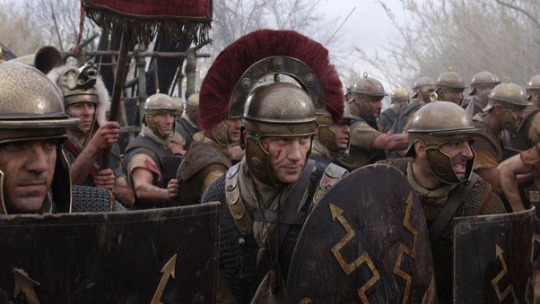
Roman soldiers had the potential to experience all of these things. The majority of Roman combat was close combat and permitted no doubt as to the killer. The comparatively short length of the gladius encouraged aggressive fighting. Caesar recounts how his men, facing a shield wall carried by the taller Gauls, leaped up on top of the shields, grabbed the upper edges with one hand, and stabbed downwards into the faces of their opponents (Caes. B. Gall. 1.52). As for mortal danger, Stefan Chrissanthos in his informative book, Warfare in the Ancient World: From the Rise of Uruk to the Fall of Rome, 3500BC-476AD, puts it this way: “For Roman soldiers, though the weapons were more primitive, the terrors and risks of combat were just as real. They had to face javelins, stones, spears, arrows, swords, cavalry charges, and maybe worst of all, the threat of being trampled by war elephants.”
Such terrors are regularly attested. During his campaign in North Africa, Caesar, noting his men’s fear, procured a number of elephants to familiarise his troops with how best to kill the beasts (Caes. B. Afr.72). It should also be noted that it was not unusual for the reserve line to be made up of veterans because they were better able to watch the combat without losing their nerve. Held in reserve, they had to watch stoically as their comrades were injured and killed, and contemplate the awful fact that they might suffer the same fate. This was not a role for the faint of heart.
However, while the Romans certainly had the raw ingredients for combat trauma, the danger for a Roman legionary was much more localised. Mortars could not be lobbed into the Green Zone, suicide bombers did not walk into the market, and garbage piled on the street did not hide powerful explosives. The danger for a Roman soldier was largely circumscribed by his moments on the field of battle, and even here, if he was with the victorious side, the casualties were likely to be light: at Gergovia, a disaster by Caesar’s standards, he lost nearly seven hundred men (Caes. B. Gall. 7.51). In his victory over Pompey the Great at Pharsalus, his casualties numbered only two hundred (Caes. B. Civ. 3.99).
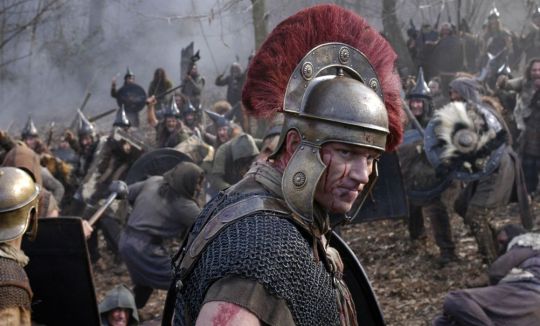
So we are left with the disturbing question: were the stressors really the same?
This is the part where I also defer to my eldest sister as a doctor and surgeon specialising in neurology and just so much smarter than myself.
My eldest sister holds the view in talking to her own American medical peers that despite similar experiences in Afghanistan and Iraq, British soldiers on average report better mental health than US soldiers.
My sister pointed out to research study done by Kings College London way back around 2015 or so that analysed 34 studies produced over a 15-year period (up to 2015) and found that overall there has been no increase in mental health issues among British personnel - with the exception of high rates of alcohol abuse among soldiers. The study was in part inspired the “significant mental health morbidity” among U.S. soldiers and reports that factors such as age and the quality of mental health programs contribute to the difference between the two nation’s servicemen and women.
She pointed out that these same studies showed that post-traumatic stress disorder afflicts roughly 2 to 5% of non-combat U.K. soldiers returning from deployment, while 7% of combat troops report PTSD. According to a General Health Questionnaire, an estimated 16 to 20% of U.K. soldiers have reported symptoms of common mental disorders, similar to the rates of the general U.K. population. In comparison, studies around the same time in 2014 showed U.S. soldiers experience PTSD at rates of 21 to 29%. The U.S. Department of Veteran Affairs estimated PTSD afflicted 11% of veterans returning from Afghanistan and 20% returning from Iraq. Major depression was reported by 14% of major soldiers according to another study commissioned by RAND corporation; roughly 7% of the general U.S. population reports similar symptoms.
It’s always tough comparing rates between countries and is not a reflection of the quality of the fighting soldier. But one finding that consistently and stubbornly refuses to go away is that over the past 20 years reported mental health problems tend to be higher among service personnel and veterans of the USA compared with the UK, Canada, Germany and Denmark.

However my sister strongly cautioned against making hasty judgements. And there could be many variable factors at play. One explanation is that American soldiers are more likely than their British counterparts to be from the reserve forces. Empirical studies showed reservists from both America and British troops were more likely to experience mental illness post-deployment. It was also worth pointing out that American soldiers also tended to be younger - being younger and inexperienced as well as untested on the battlefield, service personnel would naturally run the risk of greater and be more vulnerable to mental illness.
In contrast, the elite forces of the British army, such as your brother’s Parachute Regiment or the Royal Marines, were found to be the least affected by mental illness. It was found that in spite of elite forces experiencing some of the toughest fighting conditions, they tended to enjoy better mental health than non-elite troops. The more elite a unit is or more professional then you find that troops tend to enjoy a very deep bonds of camaraderie. As such the social cohesion of these fighting forces provides a psychological protective buffer. Not for all, but for many.

More intriguing are new avenues of discovery that might go a long way to actually understanding one of the root causes of PTSD. According to my sister, recent research carried out in the US and Europe and published in such prestigious medical journals as the New England Journal of Medicine (US) and the Lancet (UK), seems to establish a causal link between concussive injury and PTSD.
One recent study looked at US soldiers that concerned itself with the effects of concussive injuries upon troops after their return from active duty during the war in Iraq.
Of the majority of soldiers who suffered no combat injuries of any sort, 9.1 per cent exhibited symptoms consistent with PTSD. This allows a baseline for susceptibility of roughly 10% of the population. A slightly higher number (16.2%) of those who were injured in some way, but suffered no concussion, also experienced symptoms. As soon as concussive injuries were involved, however, the rates of PTSD climbed dramatically.
Although only 4.9% of the troops suffered concussions that resulted in complete loss of consciousness, 43.9% of these soldiers noted on their questionnaires that they were experiencing a range of PTSD symptoms. Of the 10.3% of the unit who suffered concussion resulting in confusion but retained consciousness, more than a quarter (27.3%) suffered symptoms. This suggests a high correlation between head trauma and the occurrence of subsequent psychological problems. The authors of the study note that ‘concern has been emerging about the possible long term effect of mild traumatic brain injury or concussion...as a result of deployment related head injuries, particularly those resulting from proximity to blast explosions’
Although these results are preliminary, if confirmed they have profound implications for anyone trying to understand the nature of warfare in the ancient world, especially the Western world.
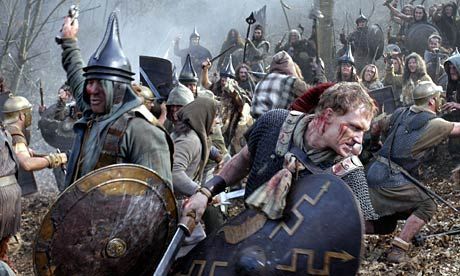
So why does it matter?
In Roman warfare, wounds were most often inflicted by edged weapons. Romans did of course experience head trauma, but the incidence of concussive injuries would have been limited both by the types of weapons they faced and by the use of helmets. Indeed the efficacy and importance of headgear for example can be deduced from the death of the Epirrote general Pyrrhus from a roof tile during the sack of Argos. It is likely that the Romans designed their helmets with an eye to blunting the force of the blows they most often encountered. Connolly has argued that helmet design in the Republican period suggests a crouching fighting stance (see P. Connolly, ‘The Roman Fighting Technique Deduced from Armour and Weaponry’, Roman Frontier Studies (1989). However my own view is that the change in helmet design may signal instead a shift in the role of troops from performing assaults on towns and fortifications when the empire was expanding (and the blows would more often rain from above) to the defence and guarding of the frontiers.
While the evidence is clear that concussion is not the only risk factor for PTSD, it is so strongly correlated that it suggests that the incidence of PTSD may have risen sharply with the arrival of modern warfare and the technology of gunpowder, shells, and plastic explosives. Indeed, accounts of shell shock from the First World War are common, and it was in the wake of that war that those observing veterans suspected that neurological damage was being caused by exploding shells.
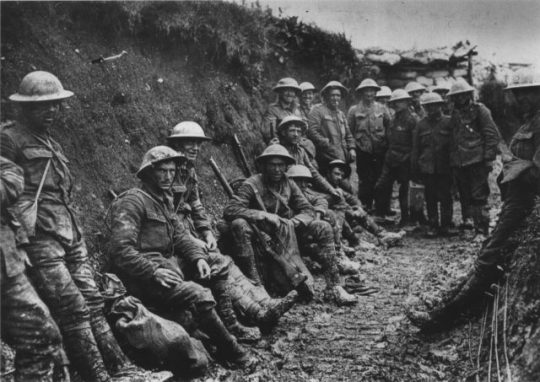
For soldiers of the Second World War and down to our modern day, an artillery barrage is like an invention of hell.
As one American put it in his memoirs of fighting the Japanese at Peleiu and Okinawa, “I developed a passionate hatred for shells. To be killed by a bullet seemed so clean and surgical but shells would not only tear and rip the body, they tortured one’s mind almost beyond the brink of sanity. After each shell I was wrung out, limp and exhausted. During prolonged shelling, I often had to restrain myself and fight back a wild inexorable urge to scream, to sob, and to cry. As Peleliu dragged on, I feared that if I ever lost control of myself under shell fire my mind would be shattered. To be under heavy shell fire was to me by far the most terrifying of combat experiences. Each time it left me feeling more forlorn and helpless, more fatalistic, and with less confidence that I could escape the dreadful law of averages that inexorably reduced our numbers. Fear is many-faceted and has many subtle nuances, but the terror and desperation endured under heavy shelling are by far the most unbearable” (see E.B. Sledge, With the Old Breed at Peleiu and Okinanwa, 2007).
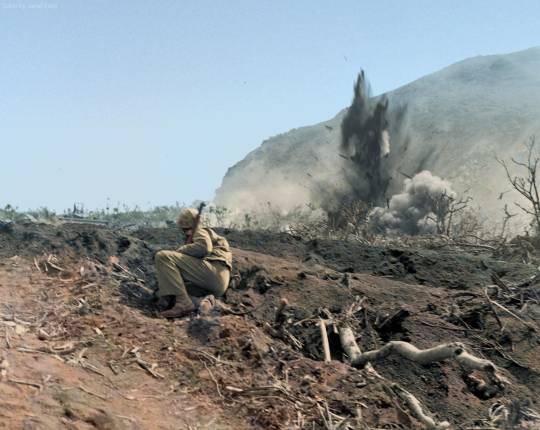
The psychological effect of shelling seems to result from the combined effect of awaiting injury while at the same time having no power to combat it.
There is another aspect that I alluded to above which is the psychological and societal conditioning of the Roman soldier. In other words a Roman male’s social and cultural expectations of his place in the world. Feelings of helplessness and fatalism were probably a less alien experience for most Romans – even those in the upper classes. In general, the Romans inhabited a world that was significantly more brutal and uncertain than our own.
This another way of saying that the Roman and 21st century combat are very different in a variety of ways that subject the modern soldier to a good deal more stress than the legionary was ever likely to suffer. And the Roman’s societal preparation – his life before the battle – was far more robust than that we enjoy today.
Take infant mortality. In the modern developed world, our infant mortality rates are about ten per thousand. In Rome, it is estimated that this number was three hundred per thousand. Three-tenths of infants would die within the first year, and an additional fifth would not make it to the age of ten - 50% of children would not survive childhood. Anecdotal evidence supports these statistics: Cornelia, the mother of the Gracchi, gave birth to twelve children between 163 bc and 152 bc; all twelve survived their father’s death in 152 bc, but only three survived to adulthood. Marcus Aurelius and his wife, Faustina, had at least twelve children but only the future emperor Commodus survived.
Then look at how that child grows up. The typical Roman child would be raised in a society that readily accepted ultra-violent arena entertainment, mob justice, frequent and bloody warfare as a fact of life. This was reinforced by religious and societal encouragement to see war as natural and beneficial, open butchering of food animals, a total lack of support structures for the poor and less able.
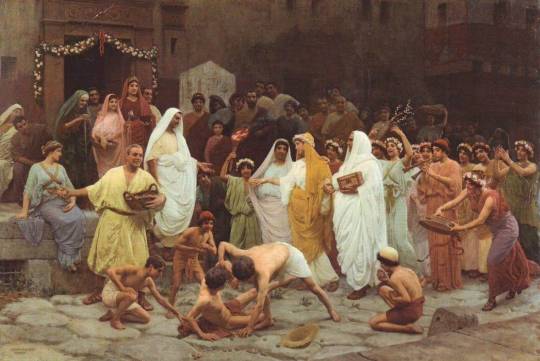
Compared to the legionary our modern soldier has been protected from such realities to a greater degree than at any other point in history, and will thus be far less well prepared for the horror of a warfare that contains far more stress factors than for a man who might fight a handful of battles in his military career, with long periods of relative calm in between, state of war notwithstanding. Modern special and elite forces training often emphasises the brutalisation and ‘rebuilding’ of the recruit in readiness for this step into darkness, but it seems likely that no such conditioning would have been needed two thousand years ago.
I would argue that we experience war very differently from the way the Romans did. Our modern identity is defined far more by our Western Christian heritage than our Western Classical roots. They are in fact world apart when it comes to ethics and morality. Consider the fact that when we talk of war and killing today we often do so through conflict between our civilian moral codes – which offer the strict injunction not to do violence to other human beings – and wartime, when men are commanded to violate such prohibitions. It is a terrible thing to try to navigate ‘Thou shalt not kill’ and the necessity of taking a life in combat.
It is sometimes the case that the qualities that make the best soldier do not make the best civilian, a point amply attested in Greek poetry by heroes such as Heracles and Odysseus.
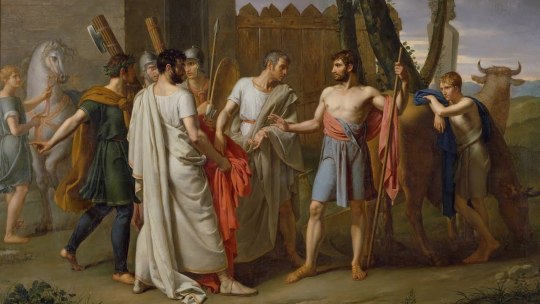
The Romans, for their part, celebrated heroes such as Cincinnatus, who could command effectively and then leave behind the power he wielded to return to his humble plough. It is important, however, when evaluating combat and its effects in the ancient world, that we do not read our ambivalence about violence onto the Romans. They inhabited an empire whose prosperity was quite openly tied to conquest.
As M. Zimmerman writes in his academic article, “Violence in Late Antiquity Reconsidered’ (2007), “The pain of the other, seen on the distorted faces of public and private monuments, or heard in the screams of criminals in the amphitheatre, reassured Romans of their own place in the world. Violence was a pervasive presence in the public space; indeed, it was an important basis for its existence, pertaining as it did not only to victories over external enemies but also to the internal order of the state.”
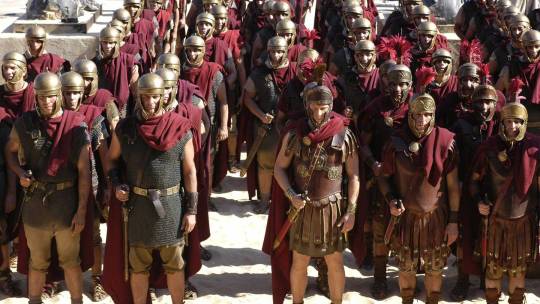
Violence then was both the means and the expression of Roman power. The Roman soldier was its instrument. The Roman warrior then would have brought a different perspective to lethal violence, and would have had a far more restricted moral circle to his modern counterpart – his friends and family, clan, patron and clients, as opposed to millions of fellow citizens via the internet and social media.
Part II follows next post
#question#ask#PTSD#war#roman#greek#classical#legionary#spartan#mental health#depression#trauma#warfare#british army#mental illness#homecoming#soldiers#combat veterans#veterans
46 notes
·
View notes
Text
- June 1992 -
Severus did not intend to visit Potter in the infirmary.
But as he made his way to deliver Madam Pomfrey’s freshly brewed potions, he found himself standing in front of a closed curtain bed where the only patient in the Medical Wing was surely resting from the incident that happened not even two nights before. A large pile of cards, gifts, and candy were stacked on top of the table beside the bed- no doubt from his many, many fans.
There was no urge to pull the curtain and see with his own eyes the damages that Potter had suffered when acquiring the Philosopher’s stone. Severus was sure that he can imagine quite clearly the destruction that he must have caused and the wounds that he had received and now suffer.
There were no words to describe the rage he felt when he had discovered along with the rest of the teachers just what Potter and his insolent friends had done.
The gall of them to sneak away at night to find and steal one of the most valuable and protected artifacts in the Wizarding World was unbelievable. The entire situation was a disaster no matter how many times Severus evaluated it.
One student, Mr. Weasley, had suffered grave injuries that were only healed by magical means and was brought to the medical wing by the sheer power of one first-year student. It was noteworthy on Ms. Granger’s part, but she thought it would be better to send a letter to the Headmaster first before brining Mr. Weasley to Madam Pomfrey or any other teacher in the vicinity.
If the situation was not already more serious than it already was, the nerve of all of them to allow Potter to continue alone, without consulting a professor of their schemes until it was far too late, was by far the most troubling thing of them all.
By the time that they had found him, Headmaster Dumbledore was already tending to Potter, who was passed out on the floor with his scar bleeding red and the noticeable stone in his hand. Beside him stood ash and the remnants of Professor Quirrell’s clothes.
It was a wonder that Potter had survived that night at all. And while Professor Dumbledore was rather tight-lipped about it, no one knows what exactly happened that night.
Severus suspects that the Headmaster will let him know with minimal detail about what had occurred. Of course, that was only if he deemed it necessary for him to know. That was, however, unlikely if he was lucky.
Yet, no matter what splendid tale of heroics and bravery that the Headmaster spieled will not amuse the Ministry. He knew very well that the Board of Education will be sending more than just a couple of words to the school as soon as the students leave later this week.
He was not sure how the Headmaster will get out of this one, but he knew that he would despite the Ministry’s best efforts. He could only imagine how the media will take it if they found out that Potter had another moment of heroics.
Severus felt his mouth snarl in disgust as he dropped off the potions and made his way back to his quarters. The Daily Prophet and Witch Weekly will surely have a field day when they get wind of the situation. The castle was already filled with gossip. Rumors flew across the halls as soon as word got out that Potter was in the infirmary for unknown reasons. As soon as these loudmouth-brats leave, it will eventually be front-page news for the next upcoming days given just how much the Wizarding World absolutely adores the Boy-Who-Lived. That was probably Dumbledore’s grand plan. The Ministry would definitely be pressured to leave well enough alone if Dumbledore played his cards right- at no cost to Potter.
Any mention of his name was scarfed down hungrily like wild dogs, as if the public was gossiped starved of their favorite wizard. The boy had become a celebrity the day he defeated the Dark Lord and if he so much as picks up a fork, his fan club will start a riot.
It did not please Severus in the least for the future and he was soon pouring himself a glass of wine from his simple collection that he had obtained over the years when he had returned to his quarters.
With a wave of his hand, books and other objects were magicked into his suitcases and he watched with a small amount of interest.
Severus found himself running out of time to prepare for his end of the year leave since he was far to busy following Quirrell around the castle under the Headmaster’s orders. With the blasted man gone and Potter unconscious in the medical wing, he finally had time to pack his things for the summer. The house-elves will eventually take his things to his home at Spinner’s End once he was done packing.
As he sipped his wine, a large leather-bound book flew across the room and was settled neatly amongst his other things.
For a moment, Severus was quite curious at the book until recognition had replaced it. With a flick of his wrist, all movement stopped and he took long strides to grab the book in question. It was the photo albums that he had found in Godric Hallow.
It was the day that Lily had died; the day that Potter had died; the day the Dark Lord was defeated. The small little house that once held a loving family was nothing but ruins now, forgotten and abandoned.
Upon hearing Black’s arrival, Severus fled the scene and made haste to reach Dumbledore before anything else could happen that night. Harry was eventually found and sent away by Headmaster Dumbledore to who knows where.
When matters were settled and the Wizarding World was celebrating like there was no morrow, Severus had found himself walking back to that small cottage and stared at the destruction that was left behind. There was barely anything salvageable.
There were only a few things that he found worth keeping: the photo album (that was barely filled with any pictures- he was sure that they had planned to fill it with Potter’s every waking moment), letters that both Lily and Potter had written, and the Potter’s family cat that had remained alive after all of its owners were long gone.
He had found the cat hidden away in the back, searching along the fallen walls and furniture, calling for its owners. Since that night, he was sure that it had not eaten or drunk anything since. Unable to do anything else, Severus had decided to take it home where it had lived with him up until three years ago when it had died of old age.
After everything, the Wizard world had a party that lasted months, up until the new year. But along with the Dark Lord’s fall, came the trials of the First War.
He was suspected of course and had found himself in Azkaban for four days before he was released. Dumbledore had fought for his innocence and had miraculously won his case. He had never been more thankful to the man whom he has sure despised him at the time.
Yet, even with his sentence cleared, the Wizarding World had been keeping up to date with the news and he found himself struggling to find a job. The Dark Mark was a brand for something terrible and cursed and nobody wanted any part of it. And while he hates it incredibly, Professor Dumbledore had given him a job, as not only to keep an eye on him, but for him to be ready for his beck and call when he needed his spy once again.
He had kept the letters and they are safely stored away in his home in his grandfather’s cigar box that was left to him, unwilling, by his father.
The album, however, was quite different. Severus has only opened it a few times over the course of the years, watching the young faces of Lily and James Potter laughing and moving with no idea of the future or their demise.
It was sickening to watch the ghost-like figures move and he could barely look at it. But when he was feeling particularly regretful and overall disgusted with his well-being on Halloween, Severus would pour himself some wine or firewhisky and he would watch the pictures move. He tortured himself in a way, reminding himself of his deeds and the misfortune that they had caused.
He had wanted to get rid of it many times, contemplating of throwing it away into the flames of the fire, but he never did. The Potters had not left much behind and he felt that he owed it to them to give it to Harry when he finally came to Hogwarts.
With a sigh, Severus made his way across the room and opened a small book. Inside was a dried daisy- the same daisy that Lily had given him the day they first met- and a couple of photos.
Severus never took pictures with Lily except for one that was now lost. The two that he had were of Lily when she was young and in school.
In both photos, she smiled brightly and waved happily back at him. He traced the folds and creases on the photos that have formed over the years before making a copy of them both and placing the originals in the album. With a sigh, he wrote a brief note and had sent one of the elves to deliver it to Hagrid. He was sure that the half-giant will be able to give it to Potter just fine.
#harry potter#hp#snape#severus snape#pro snape#pro severus snape#harry potter from snape's perspective#memories#lily#lily potter#lily evans#James potter#albus dumbledore#first war#another side of him#headcanon#fanfic#original#my work#things left untold#fanfiction
26 notes
·
View notes
Photo
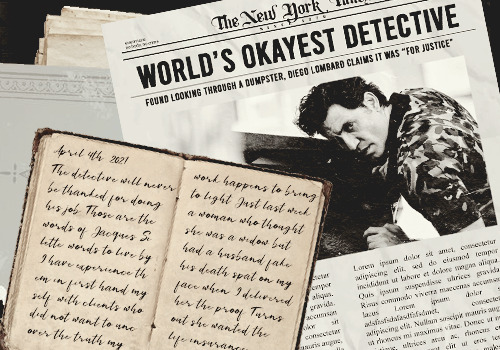
"The detective will never be thanked for revealing the truth. He will be despised, doubted, abhorred, spat upon. There will be no parades, no flowers, no medals for him. His only reward will be the awful, unbearable truth itself." –––– 𝐒𝐀𝐑𝐀 𝐆𝐑𝐀𝐍.
𝐋𝐎𝐌𝐁𝐀𝐑𝐃 𝐈𝐍𝐕𝐄𝐒𝐓𝐈𝐆𝐀𝐓𝐈𝐎𝐍𝐒
ALL CASE TYPES. FOR THE TRUTH, CALL LOMBARD.
REAL NAME: Diego Salazar Darin
ALIAS: Diego Lombard
DATE OF BIRTH: February 21st, 1982 (39 years old)
PLACE OF BIRTH: Miami, Florida
OCCUPATION: Private Investigator
RESIDENCE: Bronx, NYC
MARITAL STATUS: Single
PERSONALITY TRAITS: Human Disaster
CHARACTER PARALLELS: Holland March (The Nice Guys), Claire DeWitt (Claire DeWitt Series), Dwight Schrute (The Office), Betty Cooper (Riverdale), Benoit Blanc (Knives Out).
𝐖𝐇𝐎?
Diego Lombard is a private investigator who is infamous among the streets of New York City. Or would be, if people actually talked about him. He's not that well-known, though his posters and instagram page say otherwise. Though a dumbass, he recognizes the importance of branding, readily calling himself the world's best detective. Truth is, he is more like the world's okayest. Definitely somewhere in the top 100, if there are about 101 private detectives in the world. He'd make the cut under those conditions because, despite his erratic methods and questionable approaches to cases, he usually gets the job done. Even if only by accident.
𝐖𝐇𝐘?
TW: murder (serial killings) , death.
Fated with a generous measure of bad luck, Diego faced hardship while he was still working as an up-and-coming private dick in Miami, Florida. Under the guidance of a tutor who had taken him under his wing, the ominous Stella (who was in fact a renown private investigator who chose to give this guy a chance for god knows why), Diego began to learn the tools of the trade and make a name for himself. Together, he and Stella began looking into a series of killings that had been plaguing the city for the past three months. It was during such an investigation that Diego came across a crucial lead he forever wishes he'd never found: one that led them straight to his father. Ultimately, he helped uncover the fact that Dr. Renato Salazar was the Little Havana killer. His father's arrest brought shame to his family, caused a rift between Diego and his mother and siblings, and prompted him change his name from Salazar to Lombard. He'd have stayed in Miami and continued his training under Stella, but the woman was tragically killed in a robbery gone wrong that had no real mystery to it, ironically enough. Following her death, Diego decided to move on to New York City and try to continue his career there.
𝐖𝐇𝐄𝐑𝐄?
Based in the Bronx, Lombard Investigation's office also happens to be its owner's place of residence. Diego welcomes clients into what would've been his apartment's living room and foyer, taking up the back bedroom for himself. It's not the most comfortable of arrangements, but it's what he's got. At any rate, he doesn't exactly welcome a wide variety of potential clients for them to be an actual nuisance when he's cooking or watching television.
𝐖𝐇𝐀𝐓?
As said in his poster, instagram account, website and business cards, Diego welcomes all types of cases. There was such a time where more illustrious jobs would come to his door: disappearances and murders alike, but he has since lost a lot of his initial traction and fallen into a professional rut. Nowadays, most of what he gets are people looking to catch a cheating spouse on the act, dig up dirt on some stranger walking into their life, or even find a lost pet. He's gotten quite good for locating cats in the neighborhood, as a matter of fact. It's nothing to write a mystery novel about or anything, but it helps pay the rent. Sometimes.
𝐇𝐎𝐖?
Almost always has a toothpick between his lips. It's a mystery if he's always carrying a pack with himself or that's just the same one all the time. As we've established, the truth is not always a pleasant thing so let's not dig into this.
Of Venezuelan descent, his parents moved when he was still a baby.
He has not visited his father since his arrest, nor seen any of his relatives since leaving Miami over fifteen years ago. Just last year, he called his mother over Christmas for the first time.
Tried becoming a travel blogger once, but he doesn't travel. It was a bust.
Directly responsible for covering up Taylor Swift and Harry Style's hit and run, she still sends him her LPs as a thank you. That is the only form of payment she gave him.
Uncovered a detailed exposé on LMM that never saw the light of day;
Has had a lot of misfortune with big profile cases and seeing them through, obviously. Often got his work shut down by bigger people. One successful story he had was bringing famed actor Liam Davies to justice after proving he was responsible for his only child's disappearance. Davies is still in jail paying for his crimes;
TW: INFIDELITY Very emotionally unavailable. Has a preference for getting involved with married people so he doesn't ever have to worry about committing for real. It has happened that he's been hired by an angry spouse to investigate his own dalliance, New York is smaller than it looks.
Chose his alias based on Audrey Hepburn's character in the film Charade (1963), only to later find out it was Lampert and not Lombard like he'd thought.
𝐀𝐒𝐒𝐎𝐂𝐈𝐀𝐓𝐄𝐒: ( wanted connections )
CLIENTS: Not even the dumbest kind of mystery is too small for him. We're talking petty revenges to dig up dirt on an old enemy, possible cheating spouses, your lost pet, finding a distant relative, your car keys, the phone that you lost recently. Diego will investigate anything to get his hourly rate paid. At this point, he's not exactly a proud man.
FORMER UNHAPPY CLIENTS: Self-explanatory. People who were pissed when he did his job and told them a truth they did not care to find out. Any kind of tension from that is welcome.
PROFESSIONAL RIVAL: A private investigator infinitely more successful than he is. Better social media presence, better location, better clients, better results. Someone to make him feel worse by comparison and also to have hilarious interactions with in the event of working the same case.
4 notes
·
View notes
Note
Yandereverse god AU is a thing now? Awesome. How would izuku and todoroki fit in this one?
I focused on Izuku, here. Such an unlucky boy deserves his daily dose of intention. Oh, and the first part to this ‘AU’ can be found here, but all you need to know is that the Reader-Insert is Death, and no one over the age of one-hundred is emotionally stable.
TW: Death, Murder, Toxic Mindsets and Graphic Violence.
~
A knee scraped during a fall.
A sudden collision with a stranger.
Ink spilled on an incredibly important document, one you’ve just been told was irreplaceable.
Izuku was young, juvenile in comparison to most other deities. Even after thousands of years spent fulfilling his role, he still couldn’t bring himself to accept the utter despair of it, choosing to view the accidents and misfortune his aides brought as a dark, terrible cloud that followed him from city to town to village, over oceans and through the mountains, inflicting itself on whatever he passed, an infestation that was more than happy to feed off its patron if he didn’t provide it nourishment. Rules were useless when he didn’t have a choice in the matter, humans and Gods alike keeping their distance.
It was a lonely life, Izuku’s guilt-driven isolation doing nothing to assist his need for contact. Visitors were rare, worshippers often celebrating his absence rather than his blessings, and his attendants were no help, terribly silently, terribly stiff, clumsily executing their duties before Izuku dismissed them. No, out of some childish effort to prevent suffering, he pushed even those indebted to him away.
But, Death follows Misfortune. As a dog would, when beckoned by its owner.
You were beautiful to him, dark and distant and untouchable, always too far to understand, even as you stood at his side. He didn’t speak to you, not the first time you appeared before him nor the tenth, simply keeping his head down and paying his respects to a fox abandoned in an ancient trap or a bear left awake to starve in the winter. You’d be on his heels as he ventured into civilization, watching and waiting, walking behind him but with him, nonetheless. He would glower and glare and attempt to lose you in the crowds, and yet, he never tried to drive Death away.
Izuku hated summoning you, he despised the need for your existence, but the only thing worse than your necessity was the long, dull periods he would go without a… bad day, to put it sparingly. His curse had always been temperamental, impossible to control, even as Izuku tried to hide it away in depths of stone and solitude. His longing for you was similar, in that aspect, returning despite his better judgment. Misfortune seemed to have a similar sentiment, when it came to Death.
A sickness taking a sudden turn.
A fall with a fatal end.
Words of mercy spoken too far into a disagreement, when one party isn’t capable of returning the other’s apology.
You returned more frequently, your psychopomps always lingering nearby, ready to retrieve their master at the hint of a slowed breath. You came to stand next to Izuku, and after years of stolen glances and bitten lips, he came to take your hand. It was a simple gesture, as wordless as it was rigid, but you didn’t leave him. You didn’t pull away as his fingertips brushed against your cheeks, nor did you meet his stumbling attempts at affection with hushed protests. Your acceptance alone was enough to make all that awful screaming worth it.
You began speaking, too. You were as quiet as he’d expected, every sentence short and whispered and swift, but he cherished every trace of your voice he caught. He could’ve listened to you for hours, but every syllable had to be savored, Izuku often clinging to your robe in hopes of bringing you another step closer. You’d look upon his tragedies, his cataclysms, his masterpieces, something bright in your eyes and the ghost of a smile playing at your lips, your own touch occasionally gracing his skin. If Death appreciated the pain, the suffering he would bring, it was never made apparent, but Izuku wanted to believe you did. He wanted to believe you appreciated him.
His sacrifices became greater, grander. Each life lost in his pursuit of you brought him pain, it was true, but he knew their spirits would be placed in the hands of someone much kinder than Life, someone who would take them gently into the night and provide them a sunrise free of misery and difficulty and all the terrible things Izuku brought. He knew it’s what you would want from him, he knew it would make you happy.
That’s all Izuku wanted, really. To be the one to make you happy.
The story had come to him before he had a chance to seek it out, scandalous murmurs floating on the wind like the smoke of a distant fire. War had always clashed with Misfortune, one strong and purposeful while the other hid in the shadows, trying to act as if he didn’t exist at all. This was no different. He should’ve known you would take a lover, and he shouldn’t have been so hopeful as to wish you would choose him. Izuku had simply stumbled into an immortality he’d never wanted. Katsuki had earned your favor, however unpleasant the methods used.
When he’d come to accept his responsibilities, Izuku wasn’t sure. Between your guidance and his eagerness, his memories had blurred, blending together until there was only a time without you and a time with you, the former a much colder period than the latter. He hadn’t noticed how much the world had changed, but Izuku adapted quickly. He’d grown with your wisdom. His curse, rather, his gift didn’t need to be controlled, he saw that now. The infestation was meant to spread, as deadly as a plague and as luckless as a pilot on a starless night. Entire buildings were burnt to ash because of a single smoldering match, families were torn apart due to misunderstandings, tragedy was rampant, unavoidable.
Kings would be torn from their thrones by a rumor with innocent intentions.
Villages would be brought down with a misheard accusation.
Gods would die, if only because Izuku deemed them unlucky enough to have gained your attention.
And he would be at your side through all of it, miracles and disasters alike. He was your slave, your plaything, yours, whether or not you preferred him over such a brute. Izuku would bring you as many offerings as you desired. He would lay tributes at your feet until he was all you needed.
Misfortune was nothing if not a faithful servant, after all.
#yandere#yandere x reader#yandere x you#yandere love#yandere prompt#yandere oneshot#yandere drabble#yandere imagines#yandere scenerio#boku no hero academia#boku no hero academia imagines#yandere mythos#yandere boku no hero academia imagines#yandere boku no hero academia#yandere my hero academia imagines#yandere my hero academia#my hero academia imagines#my hero academia#bnha imagines#yandere bnha#yandere gods#izuku x reader#yandere izuku#midoriya x reader#yandere midoriya#yandere deku#deku x reader#fantasy au#yandere fairytale
428 notes
·
View notes
Text
bad horror movie ideas i've been compiling b/c @fleetwoodmurk is an enabler:
thankskilling: the family connections of a 19 year old college student allow him to skirt by any substantial sentencing for violent anti-indigenous hate crimes, just in time for him to make it home by thanksgiving. the soothing whispers of how he “shouldn’t have his life ruined for making a mistake” on property staked in stolen indigenous land invite the wrathful presence of autumn’s bounty-- a ghastly, therizinosaurus-like approximation of a turkey powered solely by the anguish of lives taken in the name of american colonialism. after all, if that family wants their son to have some turkey, then he’ll get his eight foot-tall, blade-handed, undying turkey.
homebody: forced to pull into a run-down motel by a freak storm, a group of friends initially find themselves faced with nothing more harrowing than the occasional cobweb and staff who never meet visitors face-to-face, even finding a note on the front counter that there’s no fee for staying--so long as they “spread the word” if they find their stay satisfactory. but, after waking up each morning to find that they’ve lost clumps of hair, individual teeth, and even a toe among other body parts, they discover the motel’s one and only employee--a colossal, man-like harvestman that severs human tissue with surgical precision (thanks to its spindly, 15 meter arms) in a misguided attempt to better fool human prey by grafting the fruits of its labor onto its own body.
goliath’s revenge: a japanese kaiju film director finally pushes his luck just a tad too far, killing the suit actress for the lead “goliath” monster as a direct result of the director’s penchant for strenuous, dangerous stuntwork. when his connections allow him to wriggle his way out of the tragedy scot-free, the suit actress’ furious spirit reanimates in her signature costume--now made flesh and blood--in order to exact a vengeful rampage of monstrous proportions that her former boss could only have hoped to have filmed.
more under the cut!!!
hivemind: a single mother reeling from a devastating divorce seems to find new purpose in her life thanks to a california-based branch of a yoga group that emphasizes the value of both diligence and mindfulness. as the months go by, however, she realizes that she’s so deeply invested her time with the group that she doesn’t even know the names of anyone in her neighborhood that isn’t involved with them. just as she’s having doubts, she’s invited on a week-long retreat to experience what will hopefully become an outdoor facility of theirs, and that even their founder will be in attendance. she and her daughter do indeed meet the group’s founder--a colossal, humanoid queen ant who is rendered inert by her size, subsequently relying on her psychic abilities to indoctrinate human followers to her side and transform them into “suitable workers” that would happily give their lives for her sake
children of the night: an exorcist, a private investigator, a trio of true crime podcasters, the local sheriff w/ top suspect in tow, a self-proclaimed “vampire hunter”, and a humble gravedigger all converge on the same cemetery when it becomes host to a series of unspeakably gruesome murders--the site being deemed the “vampires’ playground” for the crimes’ bloody nature. but when the self-confessed suspect winds up cleaved in twain at the scene, it turns out they’ll all have to deal with actual vampires--hulking, gorilla-like, hairless bats with the intelligence of a toddler and a permanent, gummy grin filled with teeth far too dull to consume flesh that hasn’t been playfully beaten to a fine pulp beforehand
think tank: with the untimely death of a silicon valley tech giant who’d racked up a reputation for being as antisocial as he was exploitative, a documentary crew visits his main offices in hopes of interviewing any available employees in order to determine whether or not that open secret had any truth to it. though cooperative enough, the surly defensiveness that seems to increase in prevalence as the crew makes their way up the corporate ladder leads one particularly-intrepid camerawoman to sneak the crew far further into the building than originally intended and into a hidden basement. this brings them face-to-face with the deceased entrepreneur’s dirty little secret, known as the think tank: a captive “psychic existence” brought into being using the harvested, collective brainpower of every employee who refused to take their boss’s shit but was just too talented to let go
whalefall: the 300 ft tall, walking corpse of a whale dredges its way up from the ocean floor and onto american shorelines, bringing with it tidal waves of pestilence and plague. when japanese fishermen identify the creature as a bake-kujira--a ghostly whale that harbors only misfortune and undead sealife in the wake of maritime disaster--the federal government opts to not only ignore their insight, but outright blame japan and their whaling industry for its presence. their relative inaction in the name of xenophobia and saving face will serve only to prolong the creature’s attack, with entire coastal towns left to deal with the flooding and zombified deep-sea organisms themselves.
study skin: a group of hunters grow too impatient to wait for their county’s deer season and set out under the cover of nightfall in hopes of snagging a trophy or two. though met with a highway lined with bizarre amounts of roadkill and a totally silent forest, they disregard their unease and set up for the night. they soon discover the true reason for the minimal duration of the local hunting season when they catch a glimpse of an old friend long-thought to have vanished on a hunting trip, bringing them face-to-face with the hidewinder--a mysterious creature that inhabits the skins of deceased animals in search of larger and more complex bodies to call its own, with absolutely no idea how to look or behave “right” in any of its disguises, and a tendency to become enraged once it becomes clear that it doesnt fit in.
calling card: a freelance musician struggling with being sincere and vulnerable in their own work decides to move to a small, quiet town in southern bumblefuck-nowhere to try and clear their head. to their surprise, they’ve practically moved onto the set of a musical--the town’s residents bursting into song at the drop of a hat out of what seems to be the sheer, earnest passion of their feelings. this pleasant novelty soon turns out to be a town tradition established to cope with the presence of lonesome harvey--an upright cicada-man who emerges from underground hibernation every 18 years to rip select peoples’ vocal chords right out of their throats, crudely tying them together in order to fashion a set powerful enough to function as his own (which he uses to shriek out his signature mating call every summers’ night, in hopes of attracting a partner who’ll never arrive). thus, the townsfolk sing their hearts out so that harvey can gauge whose voice he’ll claim for himself (as opposed to having him mutilate everyone in the name of trial-and-error), and the musician has moved into town just in time for ol’ harvey to make his return.
back of your mind: following the very-much-timely (if a tad mysterious) death of their verbally-abusive mother, her only child returns to their childhood home in order to collect any wayward belongings and maybe find some sort of closure in setting foot on the premises one last time. a patch of black mold on the wall that they spot on their way in seems to...change location, somehow. further investigation and attempts to simply wipe away the mold leave it in the blurred image of a gummy, toothy maw--one that begins to whisper to the visitor, claiming to have missed them oh-so-very-much from the day that they left. the strangeness of the situation keeps them coming back everyday, where the mold’s whispers begin to take a familiarly-cruel edge--at first pleading for the visitor to stay, only to take to yelling at them that no-one but the mold will accept them as the “broken, useless husk” of a person that they are.
miasma: a long line of charlatans and conmen have managed to convince a small backwoods town over generations that their collection of plastic gems and false talismans will heal them better than any medical professional could ever hope to accomplish. with most of the towns residents now being old, grey, and complacently vulnerable to disease, a new con artist moving in with a case of the stomach flu compromises the health of the entire community. and with the enticing smell of illness, comes the arrival of the scavenger--a black-feathered “vulture man” who knocks three times upon the door of his intended target, before politely entering their residence and leaving within the hour, leaving behind a bloated corpse whose orifices are stuffed with posies laying otherwise peacefully on their bed.
killing stroke: a promising rising star in the fencing scene is tragically slain in the middle of a prestigious tournament, with the cause of death being attributed to a recklessly-modified underplastron. in actuality, the poor youth’s equipment was sabotaged in order to maintain the career of a legendary fencer. on the anniversary of his death, he rises from the grave and dons his old suit in order to infiltrate that year’s iteration of the tournament--his mission being to cut down not only his rival, but anyone who upholds the same kind of narcissistic greed that claimed his life.
disassembly line: an upton sinclair-adjacent investigative journalist finds herself looking into the inner workings of a 1900s meat-packing factory in chicago, beholding the full disgusting scope of its exploitative, unsanitary working conditions. managing to acquaint herself with a few of the workers, the lunchtime whispers of one particularly-attractive lady butcher point her in the direction of a devious cover-up involving a nameless employee who “accidentally” wound up in the machinery after making too much of a ruckus about his wages. a nameless employee whose steaming, ground-up remains have now crawled out of the rickety equipment in search of postmortem vigilante justice.
catch of the day: in spite of the sustainability concerns their operation has racked up over the years, a deep-sea fishing company delves into nigh-uncontested territory--a patch of ocean deemed “dead waters” in reference to the sparse results of other companies’ attempts. their first day dredges up only a single pacific halibut, titanic even by the standards of the species. upon further inspection, the flatfish splits open in a mess of bodily fluids and blackened, inedible meat--as if the fish had already been torn apart and had decayed from the inside out. lost in the shuffle was an amniotic sac containing rapidly-growing, amphibious hagfish “mermaids” that had parasitized the halibut as they had almost all of the other fish in those waters, and that have now been unleashed on a lonely fishing boat sitting miles away from shore.
razorback bridge: a group of teenaged, amateur paranormal enthusiasts livestream their first “investigation” into a local landmark--razorback bridge, rumored to be haunted by the murderous ghost of a local farmer whose crops were so frequently ruined by invasive wild boar that he snapped and devoted the rest of his natural life to slaying the hogs, eventually losing his life to a boar that proceeded to gobble up his remains without leaving a trace. although officials have long restricted access to that part of the woods due to the aggressive nature of the wild boar inhabiting the area, the teens manage to sneak their way onto the bridge and come face-to-face with ol’ rawhide himself--a ravenous, nigh-unstoppable half-man/half-boar that came to be when the hog that consumed the old farmer had its body possessed and warped by the man’s furious ghost, far too angry to accept even the prospect of his own death.
vigor mortis: a kindly old mortician prides herself on her ability to restore bodies to exactly how they looked in life, enabling their families to have at least one source of comfort during the difficult coping process of loss. one day, however, she is presented with a body so badly mangled in an accident that she almost suggests to forgo embalming altogether and to simply refrigerate the corpse until the burial service, though she ultimately doesn’t when the distraught client begs for the process to be open-casket. try as she might, the mortician finds herself unable to make any substantial restoration on the body. in the few minutes that she steps away from the body in order to think of what else she could do, she turns back to find that it’s...vanished. she soon finds herself being pursued at every turn by the shambling corpse, now enshrouded in a body bag, and is forced to confront both a mangled revenant and a debilitating case of impostor syndrome.
making up for lost time: a conspiracy theory-themed convention is having its first go in philadelphia, pennsylvania--even hosting an artists’ alley selling everything from “ayyy lmao” keychains to collapsible foam JFK heads. when mysterious burn damage begins to show up on the property, however, the inflated egos of the guest panel speakers representing various “unorthodox investigation” groups not only refuse to give up on the convention, but are so prone to bickering amongst themselves and attempting to assume leadership that they only make it harder for the other attendees to respond to the threat of what seems to be a time traveler. that is, the victim of a first attempt at time travel so badly botched that she’s received what is mostly simply put as “space-time carpet burn”: not only is she burning, but her mind, her soul, and the very concept of her throughout space and time are burning, leaving the unreachable chrononaut in a frenzied panic that threatens to scorch everything she touches right out of existence along with her.
pearly gates: in the midst of a national emergency, a group of local landlords manage to bully their recently-unemployed tenants into coughing up just enough rent to host a get-together at their luxurious gated community. following a constant sensation of being watched and drowsy recollections of blinding light shining through their windows that first evening, the group awakens the next day to find one of them dead--groveling on her hands and knees with her entire skull seeming to have somehow...inverted. they soon realize that they’re being picked off by an angel--one so enraged by their inhuman greed that it wrenched itself free from the heavens in order to exact furious retribution.
frontera sangrienta: a softspoken chicanx youth sneaks across the american border on a nightly basis under the noses of both his immigrant parents and border patrol agents, for the express purpose of helping mexican migrants safely make their way over. one night, he is met with a family so terrified that he can make out only one word from their panic--”chupacabra”. the legendary mosquito has developed a taste for american blood after devouring careless tourists and escaped goats, and is in hot pursuit of the family considering that the mother is an american herself. the young man--a “mixed signal” to the chupacabra due to his conflicted feelings over thinking of himself as strictly american or mexican--is now the only thing standing between the family and a pitiful, bloody demise.
52: after a saturation diver is violently wrenched from their diving bell in a freak accident and their remains are presumed lost at sea, a marine salvage team is sent in by the chamber’s manufacturers under the surface-level orders to retrieve evidence for the investigation, but with the underlying message really being to “pick all that shit up so we can just sweep it under the rug quickly and quietly”. upon arrival, the crew begins picking up a bizarre frequency that would otherwise be regarded as whalesong...if not for the fact that it is much higher than the calls of any whales known to inhabit the area. the salvage team then finds themselves being picked off one by one by the source of the noise--it turns out that the saturation diver’s sheer will to live allowed their broken body to adapt to the ocean depths, taking on a warped form not too dissimilar to a beluga whale. now the former diver is left to lash out in frenzied desperation, screaming out a cry for help that falls deaf on the ears of both humans and sealife
i am but a teenage fool who knows nothing about nothing so please do not dunk on me if nothing i wrote here has any accurate basis in real-world experiences or logic. also i’ll update with more if/whenever i think of any
43 notes
·
View notes
Photo

Congratulations, HIRAYA! You’ve been accepted for the role of TITANIA. Admin Rosey: We finally have our Titania! I could scream it from the mountain tops how excited I am that you will be playing our beautiful, our wickedly intelligent, our incredibly complex Titania. They were honestly one of my absolute favorite characters to write and I had begun to lose hope that anyone would breathe life into them. But Hiraya, you have captured their voice so well, their motivation, their traits. All of it. You have captured them in a single application and I couldn’t be more pleased. You have brought us the second piece to our Fae Overlords. And now we can revel in their disaster! Please read over the checklist and send in your blog within 24 hours.
OUT OF CHARACTER
Alias | Hiraya.
Age | 20.
Preferred Pronouns | She/Her.
Activity Level | I am generally busy with schoolwork and my thesis, but I am usually on every day, and if not for replies, I am available for plots and other discussions. I can generally write replies every two to three days, but in particularly busy weeks, usually just on the weekends. I think I could rate myself at 6-7/10, numerically.
Timezone | GMT+8.
Current/Past RP Accounts | Past: [x] [x] And of course, I have my wrathful son, Easton! [edmund]
IN CHARACTER
Character | Titania; Theodora Moreau. [I would like to use Medalion Rahimi as their faceclaim, and age them down to 28 years old, please!]
Theodora Reine Celestine Moreau.
(Theodora; God’s gift. Reine; queen. Celestine; heavenly.)
Lavinia Moreau could not decide on a name, eventually gave up, and decided to simply give them all – and the woman did not only give them all these names, along with her family’s own, Moreau, but gave them all the love, riches, and attention that anyone could have ever asked for. “You are God’s gift to me, pomme d’amour,” candy apple, she calls them, fondly, punishment for the stolen apples clearly not on her mind that day she found the little girl. “And you shall grow up to be the heavenly queen of our empire. I am sure of it.”
What drew you to this character? |
Ethereal and exalted, dignified and divine. It was not only in the way they held themself, the way their head was always held high as if a crown was placed there, or the way they spoke – with a dream-like quality and a richness of vocabulary that lets one know they are in the presence of a heavenly being, brighter than the sun. It was, more than anything, evident in the very weaves of her soul – of her beautiful, beautiful mind (for I envision that Titania considers the soul and the mind to be one and the same).
However, much like a young god, they were heavenly, and yet still had the trappings of a mortal: laced with pride, gripped by their own pain and suffering, and living out their own personal hell inside their mind.
Titania was born into cruelty and filth, young eyes tainted by the scenes of horror in the streets of Verona, learning early on to fight tooth and nail for survival. The streets give no one any choice, for it has never been kind, and those who had the misfortune of having nowhere else to turn to but its puddle of blood and sin have to live every single day with fear and survive with their own brand of bravery, much like rats. They were a rat back then, and they have not forgotten and never will forget. They have learned a great many things from their time in the streets, but they knew they would never want to go back to such a lowly life of desperate hunger and piteous violence. Yet all of the memories were ingrained deep into their bones, the knowledge locked away and kept until they prove useful. But for the eyes of those outside their inner circle, they perpetuate the legends, the tall tales of their own origin that cover the truth of their true beginnings, to bury the sad truth of a childhood remembered through phantom aches of a hungry belly, and a gut eating away at itself to remind them how the most basic of needs of their needs becomes luxury when they have nothing.
Lavinia was the beacon of hope, the bright ray of sunlight that penetrated through the darkness of their life. Salvation and love and everything right in the world, in the form of a woman who is both their savior and mother. For years, they have both been awash in happiness – each one the savior of the other. But Titania should have known it could not last. Should have known that the universe liked to play its cruel games and could grant happiness as easily as it could take. And so the bright ray of light in her life ceased to shine, and their body ran cold and numb before the pain set in, more visceral than the pain hunger could bring to their gut, more painful than blood spilling from their veins. The pain ripped apart every fiber of their heart and pressed down upon their ribcage, and the devastating pain of this loss took hold of their entire body and made its home there, never to leave again.
They knew of pain more than they knew of love, now, and their mind refused to let the universe win every single second it breathes despair down into their helpless lungs. They had to create happiness in its pure form, had to believe that they need not rely on the vast uncaring universe for it anymore.
The pain has paved the way for their creative mind to shine, has given it avenues to soar, to fly high, and achieve great things. Titania has become a queen of the empire left to them by a loving mother and her wealthy name. And Titania has become a young god in their own right, one who stands at their pedestal and looks down upon the veins of the city they have grown to love, imagining all the ways their creation would color the streets their bones knew so intimately, and imagined how happiness would soon come for all. The happiness that they would mercifully grant this city of pain and suffering, with all the benevolence of an ethereal and heavenly queen.
What is a future plot idea you have in mind for the character? |
FENDING OFF THE SLUAG; The Sluag are the nightmares of the fae, the horde of darkness that comes now and then, the ones the fae desperately try to fend off. To them, Nikolai Borisov is of the sluag, their nightmare made flesh, words of taunt irking them to no end. He was one of the greatest mistakes they have ever made in their life, and they regret what has happened every single moment they see the man’s smirk and their wicked smile. Titania have been pushing off all their taunts for so long, that they want to finally silence the man. And though they are not likely to kill the arsonist, they would yearn to humiliate him, to bring him down. Whether they had to do it themself, or delegate it to someone else, it did not matter to them, as long as they witness the man’s humiliation, as much humiliation and embarrassment that he has brought them.
THE QUEEN AND THEIR CONSORT; Orpheus, ruler of his own underworld. Zeus to their Hera. They did not know what kept drawing them back to the flame. Had they been fooled by their own mind? Do they not truly understand love? They have always believed in the simple chemical nature of love, in the biology of it. But perhaps it is truly an illusion to try and control that which, millennium of poetry and stories have proven too wild to tame. Perhaps they are not as autonomous of their own emotions as they believed. I want to see what depriving themself of Oprheus’ touch will do to them, how far they could it take it before they eventually give in, and truly realize that there are some mysteries of the universe that even their own powerful mind could not even presume to control, give in once again to their heart and let it take control.
BLOOD OF THE FAERIES; The creation of the sangue is a highlight of their life – it is their life’s work and they will take every single step towards its success. I envision them using their own practice as a psychiatrist as a cover for their true purpose among the Capulets, by taking in clients in the guise of “patients” and have their dealings in their own clinic, which would have just been eastablished. I also see them testing the sangue on their test subjects here and recording their responses before they are absolutely certain it is ready for the streets of Verona.
SOARING HIGH/ DEVASTATING LOW; Once their creation hits the streets – and for it to succeed and replace the drug of the Montagues and put them out of business. I would like to see if this could somehow fill this hole in the center of their soul, if it could finally make them truly, genuinely happy. Or, the other outcome – for it to fail and knock them back down even further and see if it could be what finally makes Theodora give up on everything, or if it would only push them further to achieve even greater heights. Would they succumb to the hopelessness or would they rise back up again and power through the pain? Or would they simply break?
A SACRIFICE OF SOULS; Mikael and Celeste. They have been testing the sangue on the poor unfortunate souls which fascinate them to no end, but even though they wanted more time with their subjects to really observe the long-term effects, it was not possible. Mikael’s work and Celeste’s allegiance proves to be crutches to her plans of long-term testing. However, with recent developments, with Celeste in their clutches indefinitely, they see it as a perfect opportunity to do what they have always wanted to do.
THE PHOENIX AND THE FLAME; Companionship for information – it was the dyamic they have settled into, and Theodora revels in it. They have often wondered, however, if Halcyon, who was perceptive enough to realize that Theodora would be useful, would also be perceptive enough to notice that they were holding back. Keeping some things for themself. I would like to see what could happen if Halcyon would confront them about this, and what it would do to their relationship.
A BABE IN THE WOODS; Titania sees potential in the young saint of Verona, and surprisingly, could also see quite a bit of themself in the young woman. Perhaps they could assuage the guilt that has taken residence in their heart since their mother died, could make up for the time they had taken for granted the love that was given to them when they got too settled and comfortable in their new life. So I see Titania wanting to protect Catherine, providing her the knowledge they had, giving her reprieve from the violence that the brewing war would bring. And they would see it as a homage to their own mother, an act of following in her footsteps, doing for this Daly girl what Lavinia Moreau did for them.
Are you comfortable with killing off your character? | Yes, I have already sold my soul to this tale. I will gladly accept all the pain and suffering.
IN DEPTH
In-Character Interview:
What is your favorite place in Verona?
What does your typical day look like?
What has been your biggest mistake thus far?
What has been the most difficult task asked of you?
What are your thoughts on the war between the Capulets and the Montagues?
It was understandable, of course, how anyone from outside the circle would desperately seek to find truths about them, would crave the knowledge and map out the inner workings of their mind. Who would not want to tear apart and dissect a god, to see if they bleed just like mortals do? To see if they share the visceral internal pain that is a part of life and living? And though Verona is a pantheon, if one wanted to know about pain and suffering, they would not have chosen a better god to dissect – Titania and torment are lovers bound in a marriage neither could get out of.
So the bright-eyed young girl asks her questions, every now and again, throughout the night. Lying naked, creamy white long legs splayed across their own soft sheets. They held no affection for this girl, but they have seen Oberon with a girl just like her, and they wanted to know how the warmth between her thighs were any different to their own. They study the girl’s face and decide there was nothing special about her at all, but they were feeling merciful, so they will heed the questions.
“Verona is amazing, I’m so happy I chose to place for vacation! You live here, you probably have a favorite place, don’t you? Where is it?” she blabbered, excited eyes shining. “What’s your favorite place in Verona?”
Theodora takes a sip of her tea and looks out her windows to watch the sun rising, pushing up against the darkness and making the sky bleed, so the sun could finally shine and illuminate the word again. “All of it, darling,” They answered, sharp, dark eyes meeting the stranger’s hazel. “I have a deep fondness for the entire city,” Even the parts beyond the bridge, even the streets she swore she would never go back to. “I cannot, in good conscience, tell you that I favor one part of it more than the others. I love them all, equally.” Even darkest parts. Even the people. And because they knew it did not concern the young woman, they failed to tell her that this is what drove them to create the sangue, to help the people of her city, her home, to consume happiness, to feel it dusting their lips and coating their tongue, streaming down the river of their depraved, sinful, tormented blood. In a way, they supposed it must have been this which attracted them to Orpheus in the first place – and though he is unwittingly a voice of the downtrodden, there was no changing the fact that he is considered such. And Titania – Titania desires to become the savior of the people in their own way. The God they all worship made the people of Verona suffer, but they have been kneeling at the wrong altar. Soon, they will know this. Soon, they will know that it is by Titania’s shrine that they must offer their prayers and hymns.
“Okay, I guess that’s valid. I don’t think I could name my favorite song if you ever asked me, I like all of the music I listen to,” she plowed on, “I mean, that’s like, why I listen to them.” Titania quirked an eyebrow, nodding their head slightly, holding the young woman’s gaze, eyes never leaving. It was in their nature to be suspicious, and they looked for any sign of duplicity in the woman’s face. “Is that tea? Earl grey? Green? Mint? Chamomile? Or wait, is it jasmine?” she asked, pushing herself off the bed and padding off hurriedly to where Theodora stood, small and stubby fingers closing around theirs and pulling the cup down to take a peak. “Jasmine,” they answered, a smile blooming in their bare lips, devoid of their usual dark red lipstick. “Your name. I did not forget, in case you were wondering, bella.”
Jasmine smiled and looked up to meet their eyes. They were silent for a moment, until Jasmine twirled around, finally landing on the bed. “Is this what you do every day? Wake up early, drink tea, and then, go… I don’t know? To work? What does your typical day look like?”
“You are a curious one, caro gelsomino,” they say, setting their cup down and occupying the seat by the window, facing her, still. These questions raise alarms in their head, and they watch the other, hawk-like. To tell anyone their favorite place could mean they might seek them out in there, might wait for them to be in that place alone, vulnerable. “But there is not much to know. In fact, you have already guessed half of it. Had you continued, you needn’t hear my answer at all.” Jasmine frowned slightly, but not in annoyance. Instead, it was a frown of deep thought. “So you go to work,” she said, repeating absently. “You told me you work as a psychiatrist,” she said, looking up for confirmation, which they gave her – a small patient nod. “Have you ever been, like, really scared you’ll make mistakes when treating your patients? Like, what if something goes totally wrong? I feel like you can’t make any mistakes, but everyone makes them.” She leaned back on Theodora’s bed, placing her palms behind her, her arms supporting her body. “So I just wanna know, what’s the biggest mistake you’ve done so far?”
“None,” they answered, automatically. Mortals might know of the god’s transgressions at times, but they’ll be damned if they would tell anyone about their biggest mistakes, to let them hear it come out of their own mouth. “I have never made any.” They punctuate this with a carefree shrug, lips curved in an easy smile, though their eyes remained sharp and calculating. Why would they tell her that every single day, they regret not being there for their mother when she took the last few breaths of her life? Why would they ever tell her how they regret ever sharing their bed with the likes of an arsonist like Nikolai? Or tell her that they regretted every single night they spent tangled up under the sheets with Orpheus, and not ending his life? There is no good reason for her to know. No good reason for anyone to know their secrets.
“Never? Wow. That’s– amazing,” fake reverence, disappointment in her tone. Titania tilted her head and watched the slightest ticks in their features, watching the gears of their brains moving, rubbing against each other in a frantic motion. “Do you even find anything difficult at all? I feel like you could just do anything. What’s the most difficult thing you’ve ever done?”
“Once, I had been assigned a patient who was a pathological liar,” they said, pointedly meeting her eyes, and watching her squirm slightly. Spy, they thought. Trying to weasel out as much information as she could about the Capulet’s enigmatic emissary. “She simply could not stop the lies that spilled out of her tongue. I found her to be very difficult to deal with, but as you know, I never make mistakes. So she was, accordingly, dealt with.” The threat in her words were subtle, but if she was who they thought, it would ring loud and clear.
“I heard two mobs are fighting here.” They smiled slightly at her boldness, keeping up the ruse, with her pretending she did not know about who they really were, pretending not to think anything of what Titania had told her earlier, or them pretending she is an innocent tourist from California, backpacking across Europe, and sleeping with a strange Verona woman because she was doing all kinds of explorations.
“What do you think of the war between them? Doesn’t that break apart the city you love so much?” She met their eyes, and the flecks of gold in them shines, glinting. The small smile that curved in their mouth only widened and grew, blossomed into something lethal and wicked. They had no idea who this girl was, but they intended to find out. Their instinct was telling them she must be one of those who despised all of them – both Capulets and Montagues – and wished for all their deaths. One of those who despised how they all ruled in Verona like the new gods and goddesses, atop an Olympus of their own, creating their own pantheon. Titania stood up and grabbed their phone from the nightstand, pressing it to their ear, their left hand reaching over her face, index finger stroking her jaw gently. “Moth, instruct Quince and Flute to lock down the entire manor. Immediately.” They said no more, dropped their phone back on the nightstand, gentle fingers now holding her jaw in place.
“You are never getting out until you tell me who you work for, ‘Jasmine’.”
In-Character Para Sample:
A year before their graduation from medical school, Lavinia Moreau died. Asleep among the many textbooks and journals they had been perusing earlier that night, they were awoken by the call. ’It was her heart, Madame. Cardiac arrest. I am terribly sorry.‘ And so were they. They were terribly sorry they were not there, terribly sorry that the last time they had spoken to their mother was ten days ago, when she asked when they were coming home to visit her again, talked about a marvelous new painting she had acquired from an auction, about redecorating – “the loveliest shade of red, pomme d’amour, I’m telling you, you must see it!”—and little did they know it would be the last time they would ever hear her voice, the last thing they talked about was the redecoration of the library Theodora had asked for, with the color of red, like an apple, just like what their mother has always called them Pomme d’amour. Candy apple.
It started then, the tears. The sobs, the rage. They tore apart the pages of the journals they had been reading, the ones that kept them from coming home all this time to see their mother, the godforsaken latin honors they were vying for to make their mother proud. In the end, none of it mattered, because they were not even able to see their mother before they died, not able to whisper how much they loved her, how thankful they were. That she was God’s gift to them as much as she thought Theodora was to her.
“Je t’aime, Maman,” they whispered to the wind, rocking back and forth while they sobbed on the floor of their dimly-lit room, hoping that their words would reach the netherworld, would reach their mother’s soul and would latch on to the heart that had stopped working and tore her away from Theodora and the world of the living. “Je t’aime, Maman. Je t’aime.” They whispered over and over again, as they drowned in a river of their tears, hearing the sound of their heart getting ripped apart.
A week later, they held their mother’s ashes close to their body as they sobbed yet again, nostrils detecting the faint smell of fresh paint, their legs splayed on the floor of the library she had enriched for her darling, intelligent child. They remembered all the lessons they had received on etiquette, manners, all the trappings of high society, lovingly delivered by their mother in this very room.
“Forgive me, Maman. Please, forgive me,” they whispered into the wind once more, hoping their mother would hear.
And from this tragedy, il sangue di faerie was born. From this tragedy, Theodora Moreau began developing happiness in its purest form, to rid everyone of pain, to take it away and replace it with an exalted kind of jubilance to brighten this dark, dark world.
Extras:
MOCK BLOG.
reinadelafey.tumblr.com
HEADCANONS.
Their full name is Theodora Reine Celestine Moreau, for the late Lavinia Moreau could not decide among the three of which name to give dark-haired blessing of a girl that arrived at her hearth and home, and so she gave them all three. “God’s gift – a heavenly queen,” Lavinia told them. “It’s the perfect name for you, bambina.” And perhaps subconsciously they have tried to live up to the name they have been given, to own it and become it, down to the last atom of their being.
Theodora graduated from the University of Bologna with a degree in Chemistry (and latin honors to boot), which they turned into a pre-med, when they decided on a whim that they wanted to become a psychiatrist. The human mind has always fascinated them, and why not combine their fascination for it, with what they have learned in the four years they have studied matter and the atoms that make up the entire universe? They got into medical school immediately, and after four years, became a resident at the Hospital Villa Santa Giuliana. After completing their residency, they established their own practice in the Capulet side of Verona.
They used their psychiatric practice as a cover for their emissary work, accepting clients as “patients” and having some of their dealings with them in their clinic. In their third year of residency, they were allowed their own clinic, and no one at the hospital bat an eye, if they ever noticed anything, due to their vast connections (all forged by the Moreau name) and their incredible reputation in the field of Medicine.
They were 22 years old when their mother died, and six years later, the pain that demanded to be felt still kept grinding their bones, desperately constricting the muscles of their heart. They were thankful to know of love because of the woman, and there were moments in their life when they regretted not being able to express it more, especially in the later years of Lavinia’s life. Theodora had been far too busy with college, away from home, while their mother worked in the several companies that their small family of two owned until life was stolen back from her. They only realized the work their mother did every single day of her life for the two of them when it was too late. What did they know, back then, of love’s austere and lonely offices?
Most of their family’s money came from inheritance, and the wide array of businesses that their family owned – from shipping, to real estate and land development. Their family also owned hospitals, and only recently, a pharmaceutical company, acquired by Theodora themself. In the labs of this company, is where sangue was born, through Theodora’s own rigorous, hard work and perseverance.
Titania met Oberon at Measure by Measure, when they were initiated into the Capulet ranks. They were invited in, their creation paving the way for them to achieve emissary status right off the bat, but they still had to be initiated, else they would never have the respect of those they will work with. They were proud of their powerful mind, but they could not say the same of their nonexistent skill in fighting. They had to learn, and they had to learn fast. They sought Oberon, begged him to instruct them, and from then, the spark had turned into a flame that neither of them could ever put out.
JOURNAL WRITINGS.
“I have always been fascinated by the human mind, and often I have marveled at its capacity to contain the entire universe inside of it.”
“Perhaps the soul for the poet, and the neuron is for the scientist. And yet for me, it is one and the same.”
“I am a creator and spectator. I create for the consumption of others, and marvel at the spectacle I have catalyzed.”
4 notes
·
View notes
Text
Today’s reading from the ancient books of Proverbs and Psalms
for Thursday, September 17 of 2020 with Proverbs 17 and Psalm 17 accompanied by Psalm 90 for the 90th day of Summer and Psalm 111 for day 261 of the year
[Proverbs 17]
Better to gnaw on a bit of dry crust in peace
than to feast in a house full of stress.
A wise servant will be put in charge of a child who behaves badly
and will take a share of the inheritance like one of the family.
Silver is purified in the crucible, gold in the furnace,
but motives of the heart are judged by the Eternal.
Wrongdoers perk up when listening to gossip,
and liars lean in close to hear talk of mischief.
Anyone who makes fun of the poor disparages his Maker,
and those who celebrate another’s misfortune will not escape certain punishment.
Grandchildren are the crowning glory and ultimate delight of old age,
and parents are the pride of their children.
Elegant speech sounds odd when it comes from a fool,
and a lie on the lips of a leader is even more out of place!
A bribe is like an enchanting charm to one who counts on it—
everywhere he looks he sees the illusion of success.
Those who forgive faults foster love,
but those who repeatedly recall them ruin relationships.
A single correction makes a more lasting impression on one who is wise
than a hundred lashes do on a fool.
Evil people are determined to rebel,
and so a merciless messenger will chase them down.
Better to face a mother bear stripped of her cubs
than to encounter a fool caught up in his foolishness.
Those who repay good with evil
bring unrelenting trouble upon their families.
Picking a fight is like leaking water from a crack in a dam,
so walk away from an argument before the outburst.
Both of these deeply offend the Eternal:
one who acquits the guilty and one who condemns the innocent.
Even if fools had the means to obtain wisdom,
they would not be able to benefit from it.
A true friend loves regardless of the situation,
and a real brother exists to share the tough times.
Only a fool shakes hands on a deal
and guarantees repayment of someone else’s loan.
A person who loves sin loves a fight,
and one who builds a grand entrance dares others to tear it down.
Crooked-hearted people never recognize anything good,
and those who distort the truth court disaster.
Having a fool for a child is misery;
there is no joy in parenting a fool.
A joy-filled heart is curative balm,
but a broken spirit hurts all the way to the bone.
A wicked person accepts a bribe under the table
to derail the course of justice.
Those who understand look to wisdom for guidance,
but fools fasten their eyes on some distant horizon.
Foolish children irritate their fathers
and embitter their mothers.
Also know this: It is wrong to penalize those who do what is right
or to lash the noble because of their integrity.
Those with knowledge know when to be quiet,
and those with understanding know how to remain calm.
Even a fool who keeps quiet is considered wise,
for when he keeps his mouth shut, he appears clever.
The Book of Proverbs, Chapter 17 (The Voice)
[Psalm 17]
A David Prayer
Listen while I build my case, God,
the most honest prayer you’ll ever hear.
Show the world I’m innocent—
in your heart you know I am.
Go ahead, examine me from inside out,
surprise me in the middle of the night—
You’ll find I’m just what I say I am.
My words don’t run loose.
I’m not trying to get my way
in the world’s way.
I’m trying to get your way,
your Word’s way.
I’m staying on your trail;
I’m putting one foot
In front of the other.
I’m not giving up.
I call to you, God, because I’m sure of an answer.
So—answer! bend your ear! listen sharp!
Paint grace-graffiti on the fences;
take in your frightened children who
Are running from the neighborhood bullies
straight to you.
Keep your eye on me;
hide me under your cool wing feathers
From the wicked who are out to get me,
from mortal enemies closing in.
Their hearts are hard as nails,
their mouths blast hot air.
They are after me, nipping my heels,
determined to bring me down,
Lions ready to rip me apart,
young lions poised to pounce.
Up, God: beard them! break them!
By your sword, free me from their clutches;
Barehanded, God, break these mortals,
these flat-earth people who can’t think beyond today.
I’d like to see their bellies
swollen with famine food,
The weeds they’ve sown
harvested and baked into famine bread,
With second helpings for their children
and crusts for their babies to chew on.
And me? I plan on looking
you full in the face. When I get up,
I’ll see your full stature
and live heaven on earth.
The Book of Psalms, Poem 17 (The Message)
Book 4
The Numbers Psalms
Psalms of our pilgrimage on earth
God, the Eternal
[Psalm 90]
A Prayer of Moses, Man of God
God, it seems you’ve been our home forever;
long before the mountains were born,
Long before you brought earth itself to birth,
from “once upon a time” to “kingdom come”—you are God.
So don’t return us to mud, saying,
“Back to where you came from!”
Patience! You’ve got all the time in the world—whether
a thousand years or a day, it’s all the same to you.
Are we no more to you than a wispy dream,
no more than a blade of grass
That springs up gloriously with the rising sun
and is cut down without a second thought?
Your anger is far and away too much for us;
we’re at the end of our rope.
You keep track of all our sins; every misdeed
since we were children is entered in your books.
All we can remember is that frown on your face.
Is that all we’re ever going to get?
We live for seventy years or so
(with luck we might make it to eighty),
And what do we have to show for it? Trouble.
Toil and trouble and a marker in the graveyard.
Who can make sense of such rage,
such anger against the very ones who fear you?
Oh! Teach us to live well!
Teach us to live wisely and well!
Come back, God—how long do we have to wait?—
and treat your servants with kindness for a change.
Surprise us with love at daybreak;
then we’ll skip and dance all the day long.
Make up for the bad times with some good times;
we’ve seen enough evil to last a lifetime.
Let your servants see what you’re best at—
the ways you rule and bless your children.
And let the loveliness of our Lord, our God, rest on us,
confirming the work that we do.
Oh, yes. Affirm the work that we do!
The Book of Psalms, Poem 90 (The Message)
[Psalm 111]
Hallelujah!
I give thanks to God with everything I’ve got—
Wherever good people gather, and in the congregation.
God’s works are so great, worth
A lifetime of study—endless enjoyment!
Splendor and beauty mark his craft;
His generosity never gives out.
His miracles are his memorial—
This God of Grace, this God of Love.
He gave food to those who fear him,
He remembered to keep his ancient promise.
He proved to his people that he could do what he said:
Hand them the nations on a platter—a gift!
He manufactures truth and justice;
All his products are guaranteed to last—
Never out-of-date, never obsolete, rust-proof.
All that he makes and does is honest and true:
He paid the ransom for his people,
He ordered his Covenant kept forever.
He’s so personal and holy, worthy of our respect.
The good life begins in the fear of God—
Do that and you’ll know the blessing of God.
His Hallelujah lasts forever!
The Book of Psalms, Poem 111 (The Message)
0 notes
Photo
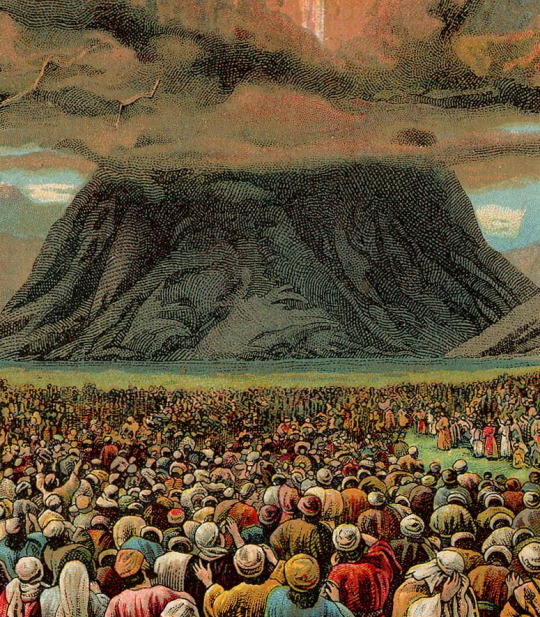
Exodus 20:18-26 comments: thunderings, and the lightnings, and the noise of the trumpet
Exodus 20:18 ¶ And all the people saw the thunderings, and the lightnings, and the noise of the trumpet, and the mountain smoking: and when the people saw it, they removed, and stood afar off. 19 And they said unto Moses, Speak thou with us, and we will hear: but let not God speak with us, lest we die. 20 And Moses said unto the people, Fear not: for God is come to prove you, and that his fear may be before your faces, that ye sin not. 21 And the people stood afar off, and Moses drew near unto the thick darkness where God was.
Exodus 20:22 ¶ And the LORD said unto Moses, Thus thou shalt say unto the children of Israel, Ye have seen that I have talked with you from heaven. 23 Ye shall not make with me gods of silver, neither shall ye make unto you gods of gold. 24 An altar of earth thou shalt make unto me, and shalt sacrifice thereon thy burnt offerings, and thy peace offerings, thy sheep, and thine oxen: in all places where I record my name I will come unto thee, and I will bless thee. 25 And if thou wilt make me an altar of stone, thou shalt not build it of hewn stone: for if thou lift up thy tool upon it, thou hast polluted it. 26 Neither shalt thou go up by steps unto mine altar, that thy nakedness be not discovered thereon.
Apart what is obvious in this passage, God wanting to impress upon the people just what and who they were dealing with, there is an important point to be made about avoiding the paganized Christianity of historical church organizations of either Roman Catholic, Greek Orthodox, or Protestant faith traditions. God did not want the Israelites to mingle worship of gods and devils with His worship in any way.
Deuteronomy 32:17 They sacrificed unto devils, not to God; to gods whom they knew not, to new gods that came newly up, whom your fathers feared not.
How do you know if you are a pagan Christian? Well, if your faith tradition or church or yourself holds on to a certain wording in a prayer that you repeat constantly like the model prayer that Jesus taught His disciples as some kind of amulet to ward off trouble as those in former times thought it should ward off evil spirits you are paganized.
This is a model prayer for the disciples not a mantra you just repeat over and over again for good luck or to command God like some pagan magician.
Matthew 6:9 ¶ After this manner therefore pray ye: Our Father which art in heaven, Hallowed be thy name. 10 Thy kingdom come. Thy will be done in earth, as it is in heaven. 11 Give us this day our daily bread. 12 And forgive us our debts, as we forgive our debtors. 13 And lead us not into temptation, but deliver us from evil: For thine is the kingdom, and the power, and the glory, for ever. Amen.
There are elements in this prayer that should be included in our prayers as well; honoring God, seeking His will, asking for what we need, pleading for mercy in the measure in which we grant it to others, deliverance from sin and calamity, and an acknowledgment of His power and sovereignty over all things. We need this more than He does. Prayer lines up our thinking with the reality of God if we follow Christ’s instruction and places us positionally in truth.
Long-winded prayers for show, not talking to God but talking to the people that hear you, and vain repetitions, almost as if you were chanting, are also symptoms of paganism.
Matthew 6:5 ¶ And when thou prayest, thou shalt not be as the hypocrites are: for they love to pray standing in the synagogues and in the corners of the streets, that they may be seen of men. Verily I say unto you, They have their reward. 6 But thou, when thou prayest, enter into thy closet, and when thou hast shut thy door, pray to thy Father which is in secret; and thy Father which seeth in secret shall reward thee openly. 7 But when ye pray, use not vain repetitions, as the heathen do: for they think that they shall be heard for their much speaking. 8 Be not ye therefore like unto them: for your Father knoweth what things ye have need of, before ye ask him.
If you believe that God has to bless you, has no choice, for any reason you are a pagan Christian. If you believe that your service to God, your faithfulness in church attendance, or your righteous convictions and moral standard; the way you live, the political candidates you vote for, and how respectable you appear in your community are things you can do to ward off evil and prevent misfortune because you know you will have God’s protection from all trouble and difficulty, family problems, disease, etc. then you are paganized. As I said previously, you do not do business with God. You do not command Him and this life, He tells us and our own experience shows, is so fragile and our situation here so precarious and temporary and all is under judgment from mankind’s sin nature that we have no guarantee of never having to face disaster, pain, or grief while we are in this body.
The Jew and the pagan brought their animal sacrifices to a temple. They formulated complex rituals and ceremonies to get their gods’ attention, rituals and ceremonies that God never commanded. They developed these formulas to obtain their gods’ approval over long periods of time, making it up as they went along.
We all carry pagan ideas into our worship from our past as we came out of various faith traditions; Catholic, Lutheran, Charismatic, Southern Baptist, etc. etc. that had allowed these pagan ideas to enter in and we must fight to remove those pagan ideas from our worship. God does not want our worship to be corrupted with the leaven of the Pharisees or of Baal.
John 4:24 God is a Spirit: and they that worship him must worship him in spirit and in truth.
God did not want altars of hewn stone like the pagans made. Verse 26 will be important later in clearing up something that some get wrong, perhaps, because of a lack of reading comprehension, but we’ll save that for when it comes up again.
Verse 22 shows a direct link through this thundering and smoke to heaven itself. In this regard, heaven came down to the Hebrews. Note the following as ways God communicated with someone He chose before the Bible was complete and the entire revelation of His ministry of reconciling mankind to Himself was available to us in book form around 150AD or even before.
Genesis 22:11 ¶ And the angel of the LORD called unto him out of heaven, and said, Abraham, Abraham: and he said, Here am I.
Acts 9:3 And as he journeyed, he came near Damascus: and suddenly there shined round about him a light from heaven: 4 And he fell to the earth, and heard a voice saying unto him, Saul, Saul, why persecutest thou me? 5 And he said, Who art thou, Lord? And the Lord said, I am Jesus whom thou persecutest: it is hard for thee to kick against the pricks. 6 And he trembling and astonished said, Lord, what wilt thou have me to do? And the Lord said unto him, Arise, and go into the city, and it shall be told thee what thou must do. 7 And the men which journeyed with him stood speechless, hearing a voice, but seeing no man.
God also speaks through man’s spirit imparting understanding and wisdom to Him.
Job 32:8 But there is a spirit in man: and the inspiration of the Almighty giveth them understanding.
2Peter 3:15 And account that the longsuffering of our Lord is salvation; even as our beloved brother Paul also according to the wisdom given unto him hath written unto you;
2Peter 1:21 For the prophecy came not in old time by the will of man: but holy men of God spake as they were moved by the Holy Ghost.
Now that we have the complete revelation of God we do not expect God to speak to us audibly nor do we accept that He has spoken voice-to-ear to some great religious leader. Whenever some religious celebrity declares that God appeared to him in his living room or some such nonsense we often laugh or shake our heads. But, we have a more sure word of prophecy in the Bible that is more certain even than a voice we think is from heaven.
2Peter 1:17 For he received from God the Father honour and glory, when there came such a voice to him from the excellent glory, This is my beloved Son, in whom I am well pleased. 18 And this voice which came from heaven we heard, when we were with him in the holy mount.
19 ¶ We have also a more sure word of prophecy; whereunto ye do well that ye take heed, as unto a light that shineth in a dark place, until the day dawn, and the day star arise in your hearts: 20 Knowing this first, that no prophecy of the scripture is of any private interpretation. 21 For the prophecy came not in old time by the will of man: but holy men of God spake as they were moved by the Holy Ghost.
Finally, the people did not want God to speak to them in verse 19. They wanted Moses to speak to them. Human nature is to follow a man; whether it be the toughest, luckiest, altogether pagan Viking or a charismatic pastor in a Fundamentalist church. They don’t want to hear from God directly. They aren’t willing to let God speak to them through His words in His book. They want everything spoon-fed to them. This allows for better control, certainly. The Puritans in the Massachusetts Bay Colony of our Colonial Era would say that God only speaks to His people through the sermon on Sundays. They denied Martin Luther’s insistence that the Holy Spirit would speak to each sincere believer through God’s own words in His book. Bible studies in people’s homes were typically outlawed. Thus, Ann Hutchinson’s famous Bible study was condemned and lies were spread about what she was teaching.
People are not comfortable with God speaking to them through His word. Just tell me what to think they would say, what to believe, for it is too terrible and disturbing to simply believe what God has preserved for me. They wanted Moses to be their mediator and their instructor and did not want to hear directly from God. So, it is today with most Christians, whether Protestant Fundamentalists or Roman Catholic.
Each of us, though, have this privilege, immense and grand in its proper application. That not only should we hear a man of God expound and exhort on what God has laid on his heart for us to hear but to let God speak to us through His own words in His own book, not just on Sunday but every day and many times a day if we are drawn to it or have memorized passages to contemplate and meditate on.
Psalm 119:15 I will meditate in thy precepts, and have respect unto thy ways.
Joshua 1:8 This book of the law shall not depart out of thy mouth; but thou shalt meditate therein day and night, that thou mayest observe to do according to all that is written therein: for then thou shalt make thy way prosperous, and then thou shalt have good success.
0 notes
Text
Insurance Law - An Indian Perspective

"Protection ought to be purchased to secure you against a cataclysm that would somehow or another be monetarily pulverizing."
In basic terms, protection permits somebody who endures a misfortune or mishap to be made up for the impacts of their setback. It lets you secure yourself against regular dangers to your wellbeing, home and monetary circumstance.
Protection in India began with no guideline in the Nineteenth Century. It was an average story of a pilgrim age: scarcely any English insurance agencies commanding the market serving for the most part huge urban focuses. After the autonomy, it took a dramatic turn. Protection was nationalized. To begin with, the life coverage organizations were nationalized in 1956, and afterward the general protection business was nationalized in 1972. It was distinctly in 1999 that the private insurance agencies have been permitted once again into the matter of protection with a limit of 26% of outside holding.
"The protection business is colossal and can be very scary. Protection is being sold for nearly everything without exception you can envision. Figuring out what's directly for you can be an overwhelming assignment."
Ideas of protection have been stretched out past the inclusion of unmistakable resource. Presently the danger of misfortunes because of abrupt changes in cash trade rates, political unsettling influence, carelessness and obligation for the harms can likewise be secured. visit here sas gujarat
However, on the off chance that an individual attentively puts resources into protection for his property before any sudden possibility then he will be appropriately made up for his misfortune when the degree of harm is determined.
The passage of the State Bank of India with its proposition of bank confirmation acquires another elements the game. The aggregate understanding of different nations in Asia has just deregulated their business sectors and has permitted remote organizations to take an interest. In the event that the experience of different nations is any guide, the predominance of the Disaster protection Enterprise and the General Protection Partnership won't vanish at any point in the near future.
The point of all protection is to repay the proprietor against misfortune emerging from an assortment of dangers, which he envisions, to his life, property and business. Protection is for the most part of two sorts: extra security and general protection. General protection implies Fire, Marine and Different protection which incorporates protection against robbery or burglary, constancy ensure, protection for manager's risk, and protection of engine vehicles, domesticated animals and harvests.
Disaster protection IN INDIA
"Disaster protection is the ardent love letter at any point composed.
It quiets down the crying of an eager child around evening time. It diminishes the core of a dispossessed widow.
It is the encouraging murmur in obscurity quiet hours of the night."
Life coverage made its presentation in India well more than 100 years prior. Its striking highlights are not as broadly comprehended in our nation as they should be. There is no legal meaning of disaster protection, however it has been characterized as an agreement of protection whereby the guaranteed consents to pay certain entireties called premiums, at determined time, and in thought thereof the safety net provider consented to pay certain aggregates of cash on certain condition sand in indicated route after occurring of a specific occasion dependent upon the span of human life.
Extra security is better than different types of reserve funds!
"There is no passing. Life coverage lifts up life and thrashings passing.
It is the exceptional we pay for the opportunity of living in the afterlife."
Investment funds through extra security ensure full assurance against danger of death of the saver. In life coverage, on death, the full entirety guaranteed is payable (with rewards any place pertinent) though in different reserve funds plans, just the sum spared (with intrigue) is payable.
The fundamental highlights of life coverage are an) it is an agreement identifying with human life, which b) accommodates installment of singular amount sum, and c) the sum is paid after the expiry of certain period or on the demise of the guaranteed. The very reason and object of the guaranteed in taking strategies from disaster protection organizations is to defend the enthusiasm of his wards viz., spouse and kids all things considered, in the even of sudden passing of the guaranteed because of the event in any possibility. A life coverage arrangement is likewise commonly acknowledged as security for even a business credit.
NON-Life coverage
"Each advantage has a worth and the matter of general protection is identified with the assurance of monetary estimation of benefits."
Non-life coverage implies protection other than disaster protection, for example, fire, marine, mishap, clinical, engine vehicle and family protection. Resources would have been made through the endeavors of proprietor, which can be through structure, vehicles, apparatus and other substantial properties. Since substantial property has a physical shape and consistency, it is dependent upon numerous dangers extending from fire, partnered hazards to burglary and theft.
Not many of the General Protection arrangements are:
Property Protection: The house is most esteemed belonging. The arrangement is intended to cover the different dangers under a solitary strategy. It gives assurance to property and enthusiasm of the safeguarded and family.
Medical coverage: It gives spread, which deals with clinical costs following hospitalization from abrupt disease or mishap.
Individual Mishap Protection: This protection arrangement gives pay to death toll or injury (halfway or lasting) brought about by a mishap. This incorporates repayment of cost of treatment and the utilization of medical clinic offices for the treatment.
Travel Protection: The arrangement covers the guaranteed against different outcomes while voyaging abroad. It covers the guaranteed against individual mishap, clinical costs and repatriation, loss of checked things, identification and so forth.
Obligation Protection: This approach repays the Executives or Officials or different experts against misfortune emerging from claims made against them by reason of any improper Demonstration in their Official limit.
Engine Protection: Engine Vehicles Act expresses that each engine vehicle utilizing out and about must be guaranteed, with in any event Obligation just arrangement. There are two sorts of approach one covering the demonstration of obligation, while different spreads safety net providers all risk and harm caused to one's vehicles.
Excursion FROM A Baby TO Youth!
Verifiable Point of view
The historical backdrop of extra security in India goes back to 1818 when it was imagined as a way to accommodate English Widows. Strikingly in those days a higher premium was charged for Indian lives than the non-Indian lives as Indian lives were viewed as progressively hazardous for inclusion.
The Bombay Shared Life coverage Society began its business in 1870. It was the main organization to charge same premium for both Indian and non-Indian lives. The Oriental Confirmation Organization was set up in 1880. The General protection business in India, then again, can follow its underlying foundations to the Triton (Tital) Insurance agency Constrained, the main general insurance agency built up in the year 1850 in Calcutta by the English. Till the finish of nineteenth century protection business was as a rule in the hands of abroad organizations.
Protection guideline officially started in India with the death of the Disaster protection Organizations Demonstration of 1912 and the Fortunate Reserve Demonstration of 1912. A few cheats during 20's and 30's profaned protection business in India. By 1938 there were 176 insurance agencies. The main thorough enactment was presented with the Protection Demonstration of 1938 that gave severe State Authority over protection business. The protection business developed at a quicker pace after freedom. Indian organizations fortified their hang on this business yet in spite of the development that was seen, protection stayed a urban marvel.
The Administration of India in 1956, united more than 240 private life back up plans and opportune social orders under one nationalized imposing business model partnership and Extra security Enterprise (LIC) was conceived. Nationalization was legitimized in light of the fact that it would make genuinely necessary assets for quick industrialization. This was in congruity with the Administration's picked way of State lead arranging and improvement.
The (non-life coverage) business kept on succeeding with the private area till 1972. Their activities were limited to sorted out exchange and industry in enormous urban areas. The general protection industry was nationalized in 1972. With this, about 107 safety net providers were amalgamated and gathered into four organizations - National Insurance agency, New India Affirmation Organization, Oriental Insurance agency and Joined India Insurance agency. These were auxiliaries of the General Insurance agency (GIC).
The disaster protection industry was nationalized under the Life coverage Partnership (LIC) Demonstration of India. Somehow or another, the LIC has gotten thriving. Notwithstanding being an imposing business model, it has some 60-70 million policyholders. Given that the Indian white collar class is around 250-300 million, the LIC has figured out how to catch somewhere in the range of 30 odd percent of it. Around 48% of the clients of the LIC are from rustic and semi-urban regions. This presumably would not have happened had the sanction of the LIC not explicitly set out the objective of serving the country territories. A high sparing rate in India is one of the exogenous elements that have helped the LIC to develop quickly lately. In spite of the sparing rate being high in India (contrasted and different nations with a comparable degree of advancement), Indians show high level of hazard avoidance. Accordingly, about portion of the speculations are in physical resources (like property and gold). Around twenty three percent are in (low yielding yet protected) bank stores. What's more, some 1.3 percent of the Gross domestic product are in disaster protection related investment funds vehicles. This figure has multiplied somewhere in the range of 1985 and 1995.
A World perspective - Life coverage in India
In numerous nations, protection has been a type of investment funds. In many created nations, a critical portion of residential s
0 notes
Text
Oedipus Rex: Story, summary, main characters & themes
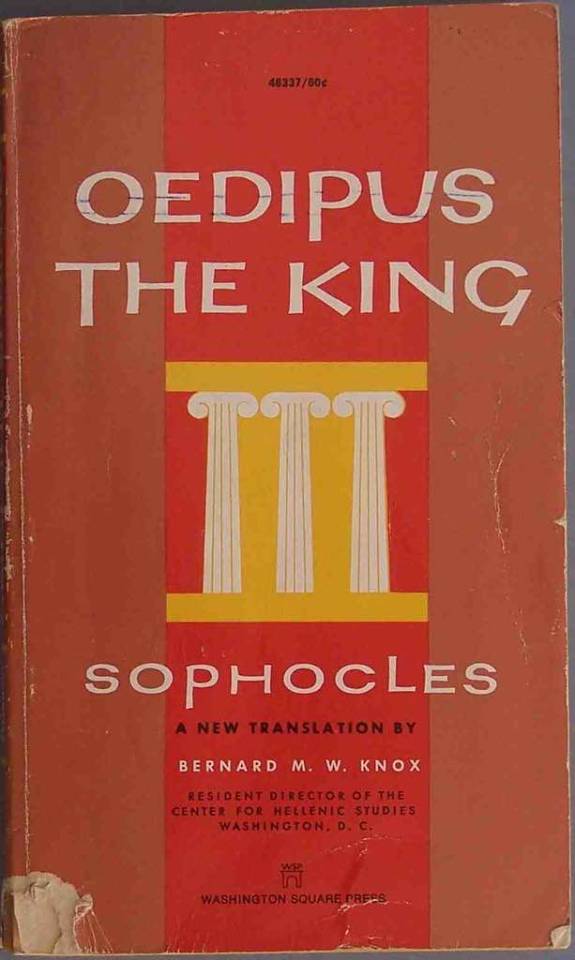
Oedipus Rex is an ancient Greek tragedy by Sophocles that tells the tale of King Oedipus of Thebes which previously performed in around 429 BCE. Oedipus means "swollen foot" and originated from the Greek word "Oidípous". The play is a disaster featuring the role of destiny and chance just as the pride which in many cases combine to bring a shocking end much beyond human imagination.
Main characters of Oedipus Rex
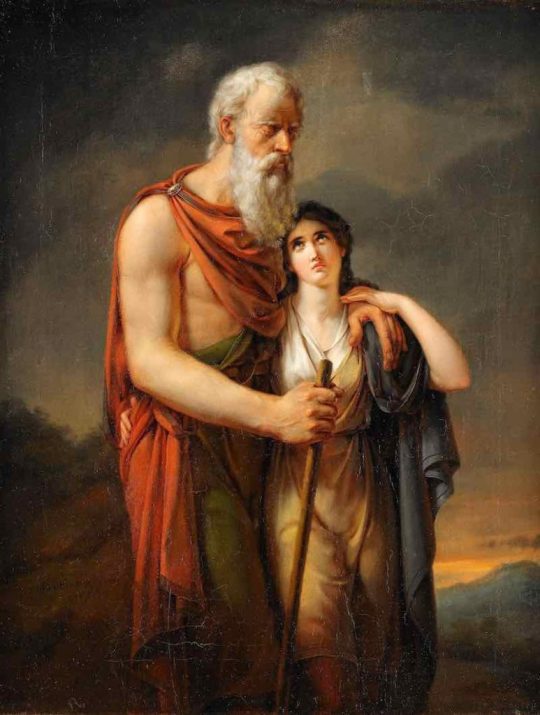
Antigone: daughter of Oedipus
Oedipus: tragic hero
Jocasta: Oedipus’s wife and mother, and Creon’s sister.
Antigone: Child of Oedipus and Jocasta
Creon: Oedipus’s brother-in-law,
Polynices: Son of Oedipus and thus also his brother.
Tiresias: the blind prophet of Thebes
Haemon: Creon’s son
Ismene: Oedipus’s daughter
Theseus: The king of Athens
Summary of Oedipus Rex
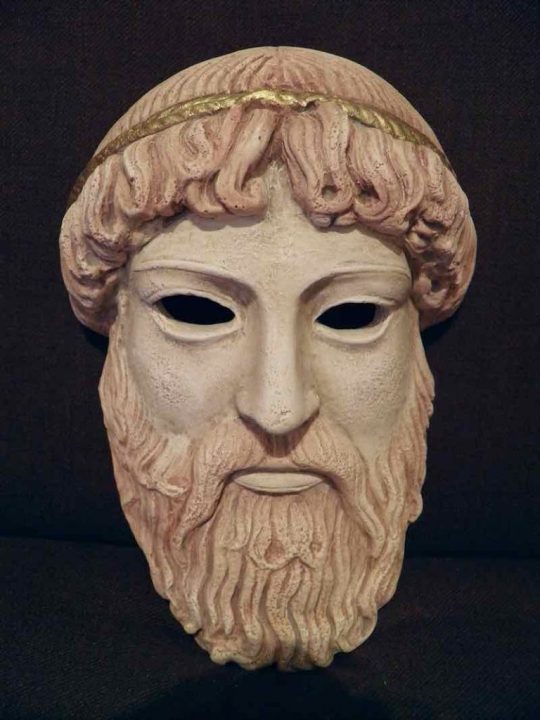
blind oedipus rex
The play opens with Oedipus, the lord of Thebes, who is tending to the people of Thebes. A horrible curse has happened to his kingdom of Thebes. They have come to approach Oedipus for planning something for salvage them from their misfortune and disaster. Oedipus sends his brother-in-law, Creon, to look for the counsel of Apollo. Creon advises Oedipus that the curse will be lifted if the killer of Laius—the previous ruler—is found and indicted. Oedipus devotes himself to the disclosure and indictment of Laius' killer. Oedipus starts to talk about with the individuals of his court about the murder of the king. They relate that they know nothing of the murder and the killers. Nonetheless, they told the way that the king was murdered close to cross roads when Sphinx had caused death upon them till Oedipus protected them.
Before long Oedipus is informed regarding Tiresias, the soothsayer by Creon. He can see beyond human information and is known to have control over things hidden from mortals. Oedipus looks for him in the court. Tiresias shows up yet doesn't disclose to Oedipus anything of the killer. Oedipus abuses and accuses him of misrepresentation. Teiresias, the visually impaired prophet, advises Oedipus that Oedipus himself killed Laius. This news disturbs Oedipus, yet his wife Jocasta lets him know not to trust in prophet, they've been wrong previously. She gladly relates that the prediction has neglected to work out. Jocasta says she has lost her only child because of a prediction, so she utters:
"And I will no more turn mine eyes This way nor that for all their prophecies".
she enlightens Oedipus about how she and King Laius had a child who was forecasted to murder Laius and lay down with her. She and Laius had the child killed, so clearly that prediction didn't worked out, isn't that so? Jocasta's story doesn't comfort Oedipus.
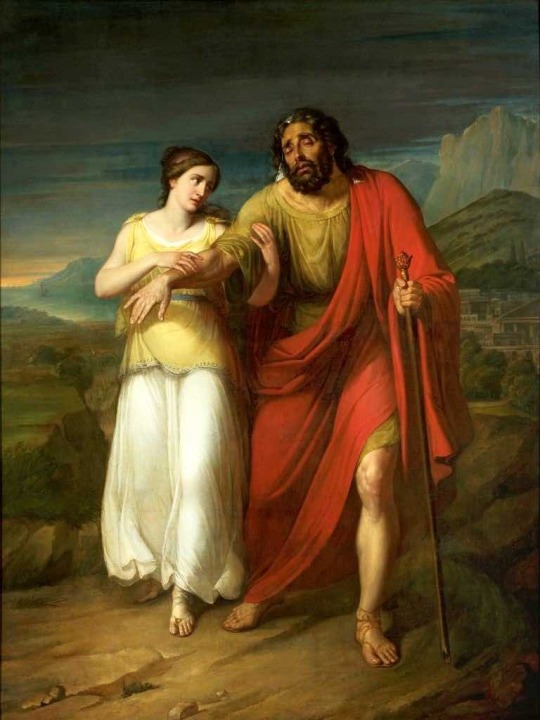
Oedipus_and_Antigone
A messenger lands from Corinth and informs Oedipus regarding the death of his father. Oedipus relates how he fled to stay away from the murdering of his dad. The stranger told to Oedipus that he is the adopted child of the ruler. This puts Oedipus in profound misery and he wishes to go further. His wife and mother, Jocasta, understands the foul play because of destiny and attempts to prevent Oedipus from advancing into the issue yet he would not hear her out. He delves into the issue and is soon arrived at the outcome that he is simply the child of the dead ruler he himself killed. He is the damned that married his own mother and can't flee from reality. Jocasta understands that she is Oedipus' mother and that Laius was his father. Astonished at what has occurred, she kills herself. Presently, Oedipus, as well, understands that he was Laius' killer and that he's been married to (and having children with) his mom. With dismay and sadness, he gouges his eyes out and is banished from Thebes.
Read about Doctor Faustus: tragic hero, morality and renaissance play here
Also read here what are some important factors causing global warming?
Read here main reasons and solutions for unemployment
Looking for causes and solutions to immigration? Read here
Main themes Oedipus Rex
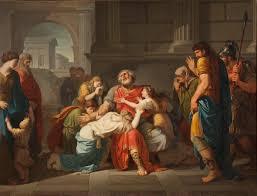
tragic hero
fate and free will
the conflict between the individual and the state
people’s willingness
sight and blindness
Conclusion
Neither Jocasta nor her servant could force themselves to slaughter Oedipus and he was abandoned to components. There he was found and raised by a shepherd, before being taken in and brought up in the court of the childless King Polybus of Corinth as though he were his very own child. His name's literal meaning ("swollen foot"). Oedipus proceeds to question a messenger and a shepherd, both of whom have information about how Oedipus was deserted as a baby and received by another family. He would in the end kill his biological father and sleep with his biological mother. The Chorus, alone, mourns Oedipus' tragic destiny and his doomed heredity.
Read the full article
0 notes
Text
The Wall: A Short Story
When the wall was finished, it was hailed as a godsend. “Finally, we will be free from these pariahs!” was the general consensus among the older generation.
Not to say that some of the younger generation didn’t fall victim to it either. They did—it’s just that most of us were paying attention and called it long before the disaster. Now, of course, the older generation blames us for not telling them, for not speaking up. Yet we shouted until our throats were sore and walked till our feet bled, but still they did not listen. The wall was just a means to an end and it wasn’t the first thing that happened either.
First they passed a law combining the church and the state, making Christianity the official religion of the country. Anyone practicing anything different than the prescribed religion was subject to extreme scrutiny, ridicule, and some were even jailed. This included alternate denominations, once numbering so many, but now dwindled down to one, except for a few renegades trying to actually help people.
Once the religious laws were put in place, unreasonable search and seizure laws followed—ones that allowed men in dark clothes to break in and arrest peaceful citizens for illegal practices and possession of religious contraband. Everything was seized: bank accounts, business holdings, homes, and even clothing.
Any foreign-born people found guilty of such crimes were immediately deemed uncooperative and the women and children were deported while the men were arrested and sent to languish in newly built prisons, but not before they were paraded in the streets as enemies of the church and pelted with garbage. All the assets taken in these raids were liquidated and funneled into construction for that terrible wall, paid for by the misfortunes of the ruthlessly deported and built by the poor fellows who were forced to stay behind.
“This is good!” the cries came, “they’ll repay the debt they owe to us honest citizens!” Little did they know what would soon befall them.
When the first wall was completed, we thought we were safe. Things would level out. The worst was over! We were wrong. Some saw it coming and tried to escape. Maybe that’s what brought it on, maybe it was already in the works—who knows—but either way, our brave and brilliant leader decided to build another wall, this one to the North. His marketing team said it was to keep us safe from an invasion because our lovely neighbors were getting jealous, but truthfully, we were trapped. Travel out of the country slowed to a crawl and then came to a complete stand still.
“It’s alright… this is all part of a brilliant plan to make us a great power again…” some voices said, although markedly fewer than before and with greater uncertainty.
“Now is the time for American ingenuity!” The marketing team called through the streets and into bullhorns. “Let’s band together and bring back our independence! Make America a trend setter and a stalwart force against shoddy workmanship!”
We were beguiled once again and cheered. “Things are changing! Finally, we’re getting what we want!”
This stage of insanity began with the factories. They were begun in the Midwest because it had ‘all this empty land.’ Huge complexes, twice the size of football fields, were built.
“Unemployment is falling!” people cried. “we’ll all be able to feed our families!“
While it was true these factories were hiring people, they were being paid peanuts. The excuse was that it was a new enterprise, and was all being done for the good of the country. Eventually child labor laws were rewritten to allow anyone ages twelve and older to work the floors, then lowered again to eight. As much as we hated that our children were being put through such torturous labors, for some families it was all they could do to put food on the table.
Food prices skyrocketed after the imports stopped and factories began to encroach upon farmland. Even when the factories were miles away, pollution crept into our water sources and poisoned the crops.
Ecological scientists were forbidden from releasing their findings to the public, and eventually all such companies were disbanded, except for the select few who were willing to be bought out by the presidential administration. All science became production and engineering based.
An aristocracy of sorts began to form because only the richest families were able to afford schooling. Public schools had very few attendees and even fewer teachers. School hours were cut to adjust for the new work hours of 6 am to 6pm. Those of course were for the children. Most adults were forced to work sunrise to moonrise. Average sleep time dropped from six hours for working adults to two hours.
No one could keep up, and that’s when the drug trade started to ravage the country once more. No one is quite sure where it came from and why our counter-drug units were unable to stop the tirade. My sources say that it’s coming in on two fronts: one of which is funded by one of the president’s many shadow companies. Any real dealer that the counter-drug arrests is turned back out into the streets, often with an even greater supply. Any poor citizen unlucky enough to draw a short straw is strung up in city squares and their executions are broadcast across the country as a front.
“We keep you safe!” the marketing team says. “Look at these dangerous villains that no longer darken our doorstep!”
Most don’t fall for it anymore, but it’s too late. We handed over the reigns to a tyrant and he lived up to every single campaign promise. All the information concerning his plans was right out there in the open, but too much of the country was blinded by hated and showmanship to notice.
For now, our light is blotted out by thick black smoke of factories whose floors are soaked with the blood of overworked child workers. In our streets roam half-starving citizens living in run-down homes. I only hope that this brief record of our horrid history for the last ten years will survive into brighter times. May the children always know what became of their ancestors and that the future sees an overthrow of this corrupt government.
1 note
·
View note
Text
Deep Trouble: The Misfortune and Miracle of the Cherry Mine Disaster
As the Industrial Revolution arrived in the United States the idea of work greatly moved from the fields above to the depths of the earth below. Many facets of the new industries needed energy, and one source of that energy was coal. Buried deep underground, the process of harvesting this new essential crop was filthy, hot, dry, wet, backbreaking, and extremely dangerous. Workforces pushed for more and more coal and coal miners were not paid by the hour, but by how much coal they extracted from the earth. The hours were long and very often the blistered hands were young with entire families working in the mines in order to make as much money as possible.
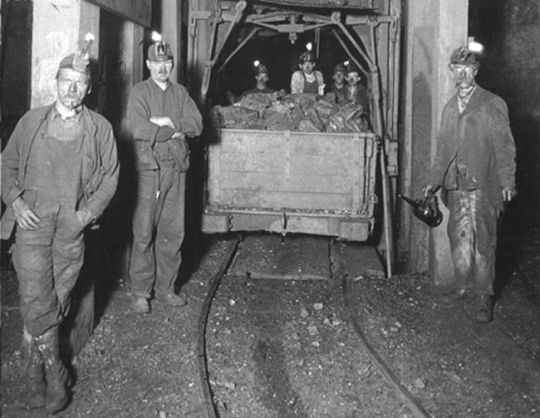
A typical mining scene from the early 1900s.
With cramped spaces, poor ventilation, wood and rope mechanisms, and light coming from lit candles, mines were prime environments for tragedy. When the St. Paul Coal Company opened their mine in Cherry, Illinois in 1905 it promised state-of-the-art safety measures including electrical lighting and a building with a large fan providing fresh air down below. These features were probably appealing to the workers, in the mines of northern Illinois alone approximately half a dozen miners were dying on the job every month. There was still a long list of dangers but the Cherry Mine was hugely profitable, producing around 300,000 tons of coal annually, and the mostly Italian immigrant workforce accepted the risks in pursuit of a better life outside the mine.
The construction of the Cherry Mine included three horizontal levels with two vertical shafts, a main and a secondary, going through them at approximately one hundred yards apart. Both shafts had wooden steps and ladders. The top of the main shaft had an eighty-five-foot-tall steel tower that controlled a mechanical cage used by the miners to travel up and down through the mine. At the top of the secondary shaft, which also served as an escape shaft, was the large industrial fan building that provided the luxury of fresh air to the workers.
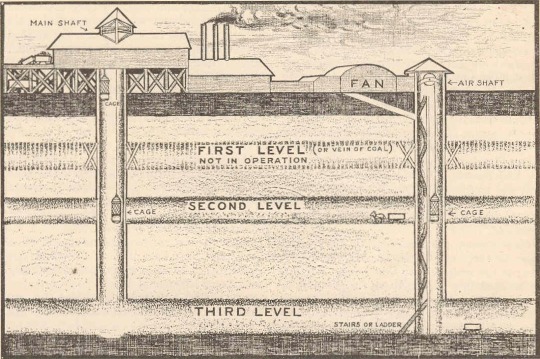
Layout of the Cherry Mine.
On Saturday, November 13th, 1909 the nearly 500 employees of the Cherry Mine arrived at a work site that was slacking on some of its promises. Although it was fitted with electricity the mine had been without power for weeks forcing the miners to rely on flaming kerosene torches for light. The day was progressing as usual and the workers watched the noon hour arrive, bringing with it a small reprieve from the labor. When the workforce returned from their break none of the souls on site saw any indication of the terrible turn the day was about to take.
In addition to the human employees, the Cherry Mine also ran on the power of three dozen mules, all of which needed to be fed. Six bales of hay were loaded into a wagon to be lowered down to the animals and when the hay arrived at the second level it came into contact with one of the many kerosene torches providing the only light for the workers. But, the resulting fire was small, so small that a number of miners walked right past it in order to ride the 1:30pm cage up to the surface and there was initially no mention of it when they arrived above ground. As smoke began to build the miners began to take notice and attempted to put out the still considered minor blaze, but the smoke steadily thickened, and the situation began to reveal itself as urgent. The eventual solution was to drop the cage with the flaming hay down to the third level where there were water hoses used to wash the mules, but the cage got stuck. Eventually the contents of the fiery wagon was simply dumped down the shaft where it was easily extinguished. What the miners further down in the third level did not know was that as the hay traveled down it had ignited all the wooden support timbers on the second level and the air flow from the fan was quickly fanning the flames. The miners on the third level noticed their air quality diminishing and they called for a cage to be lowered but got no response. After climbing the ladder 165 feet up to the second level they were met with a horrifying sight, the cage station was left unmanned and the passageway was ablaze.
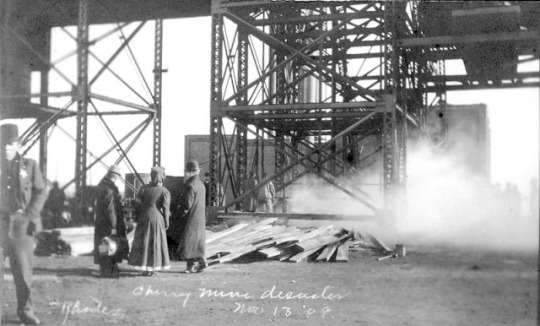
Photo taken on November 13th showing smoke rising from the mine.
It took forty-five minutes after the fire began for the evacuation call to be made. Cages full of men began racing to the surface while others scrambled up the ladders but the situation was dire for those working down on the third level. At approximately 2pm someone reversed the large industrial fan on the surface in an attempt to suck air out of the mine and minimize the fire, but it only made the situation worse turning the mine shafts into walls of flames and cutting off an escape route from the third level. When some of the miners from the third level reached the second level above them, they found the ladders to the surface burning due to the air and flames being sucked upward.
Cages were repeatedly lowered and brought up filled with dozens of panicked workers, many of whom owed their lives not to other miners, but to Cherry locals who ran to their aid. A group of approximately one dozen people including the mine manager, a local grocer, and a clothier all volunteered to go down into the mine in order to rescue some of the hundreds of workers that were still below and quickly succumbing to the lack of oxygen. The men made six successful trips down into the depths but on their seventh trip down the signals coming back up to the cage operator were jumbled and nonsensical, eventually stopping all together. When the operator brought the cage back up all twelve people inside had been burned to death from being lowered directly into the fire. When the fire department arrived on the scene they were forbidden to go down into the mines and their efforts were reduced to pouring water down into the burning mine shafts. At approximately 4pm the assumption was that they had done all they could and the shafts were closed. There were still 280 miners left underground.
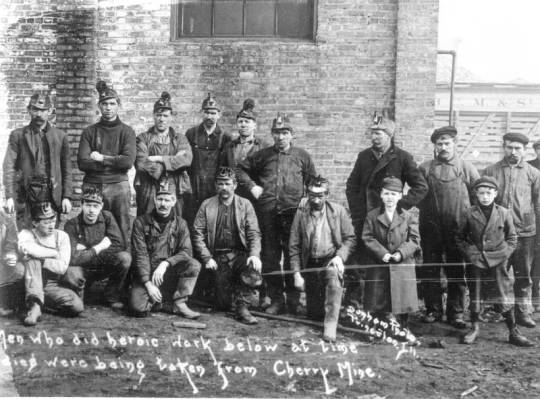
A group of miners who lost their lives in the Cherry Mine.
When Thomas White, Walter Waite, and George Eddy went to work on November 13th 1909 they had no idea what horror would befall hundreds of their coworkers that day. White and Waite were among a group of twenty-one laborers working in a secluded portion on the mine when Eddy, a mine examiner, informed them of the turmoil unfolding. The men rang for a cage to be lowered in order to escape but after getting no response they realized their unimaginable situation, they were left on their own inside the inferno.
The dangers of being left behind in the mine extended beyond the flames. Another killer lurking in the tunnels was Black Damp, a toxic mix of water vapor, carbon dioxide, and nitrogen that remains in the environment after oxygen has been depleted. The group of twenty-one miners attempted to find an escape route twice but both times they were beaten back by flames. Upon their third trip out into the darkness they encountered the dreaded Black Damp. This meant only one thing, the mines had been sealed and the oxygen was quickly fading away. With few options remaining the men collected themselves into a small, secluded area of the mine and began to build a wall of mud, rocks, and timbers to separate themselves from the fumes and flames. With only a few lanterns the men found themselves barricaded inside a small passage less than 500 feet long. All they could do was hope for a miracle.
Every minute spent in the passage was agonizing. The men had no food and their only source of water was a small trickle that crept into their chamber and had to be collected, guarded, and rationed. In order to pass along both the time, and what they thought could be their final message to family, the miners wrote letters. One penned by Eddy reveals his opinion that survival was unlikely:
Dear wife and children:
I write these few lines to you and I think it will be for the last time. I have tried to get out twice, but was driven back. There seems to be no hope for us. I came down this shaft yesterday to help to save the men's lives. I hope the men I got out were saved. Well. Lizzie, if I am found dead take me to bury me in Streator and move back. Keep Esther and Jenny and Clarence together as much as you can. I hope they will not forget their father, so I will bid you all good-by, and. God bless you all.
George Eddy.
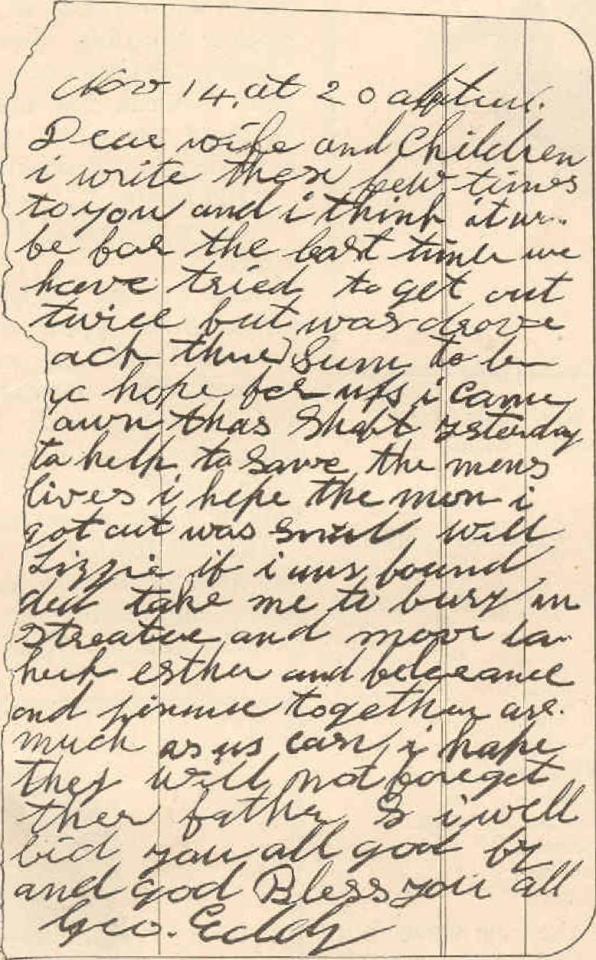
The letter written by George Eddy to his wife and children while he was trapped in the mine.
While the miners sat hundreds of feet under the surface they had no way of knowing what, if anything, was being done in order to save them. Meanwhile, in a terrible parallel, no one on the surface knew if there was anyone left down below to be saved.
Given the newness of the mining industry the processes of how to go about a recovery after disaster were still in their infancy. The day after the tragedy, on Sunday November 14th , rescue chief Robert Y. Williams of the United States Geologic Survey (USGS) and George S. Rice, Chief Mining Engineer at the Technologic Branch of the USGS, attempted to enter the mines but the still-blazing fires were too strong for the men to enter.
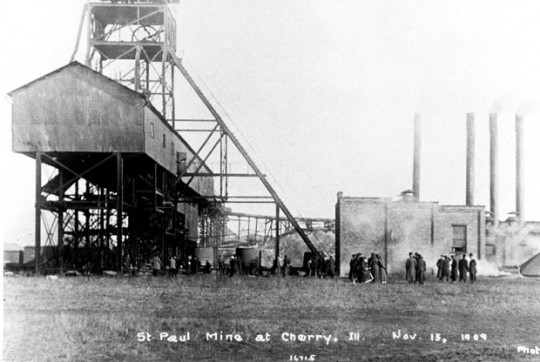
The Cherry Mine and volunteers the day after the fire.
On Wednesday November 17th there was a discussion between Rice and A J. Earling, President of the Chicago, Milwaukee, & St. Paul Railroad. Despite the odds, Rice still believed it was possible that there were survivors in the mine depending on how isolated they were when working in relation to the flames. Inspectors fought the notion of treating the proceedings as a rescue mission, in their minds too many had died in the blaze and twelve more had already died attempting rescues. In the end one investigator said that it was his belief that the USGS inspectors should continue their investigation and Williams descended into the mine.
The air was noticeably clearer.
Over the course of the next few days Rice and Williams went into the mine and upon finding that the air was free of toxic fumes state inspectors began the horrific task of collecting the dozens of bodies that never had the chance to return home.
Saturday November 20th marked nearly one week after the Cherry Mine made the tragic turn from mine to morgue and for the twenty-one workers still trapped below time was running out. Some of the men spiraled into incoherent rambling, others crumbled in sheer weakness, and those who were still able to function knew there was nothing left to lose, they were going to break through the wall and go into the mine tunnels. Upon emerging from behind their handmade wall the healthiest of the men began moving outward in groups of four. To their relief and surprise they found that the air was no longer toxic, oxygen was back in the tunnels, which meant that someone had re-opened the mine shafts above.
After several hours of working through the tunnels a group of eight lost miners finally heard the sounds of salvation. Voices. A rescue party, led by Williams and Rice who pushed for rescue efforts in the days after the disaster, found the men and were quickly informed that there were more survivors that needed help. Rice was the only one on site who knew how to operate the apparatus needed to bring them all up to the surface. He trained volunteers how to use the device on the spot and by 1pm that afternoon the twenty-one miners were above ground, alive.
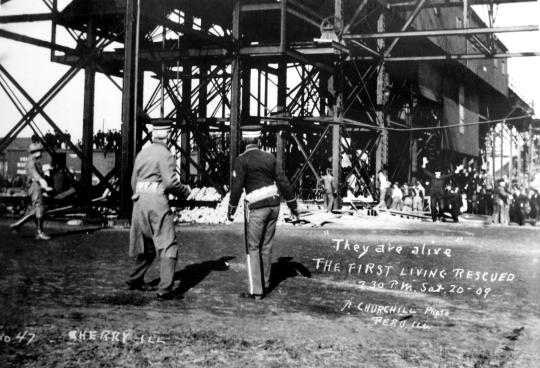
Image of the twenty-one miners being brought up alive.
To call Thomas White, Walter Waite, George Eddy, and their fellow workers lucky would be an understatement. The search continued but no other living miners were found. When the mine was finally closed for good the death toll stood at 259 lives lost leaving behind 160 widows and 390 children. Daniel Holafick, the oldest of the twenty-one trapped miners, was brought out unconscious and succumbed to breathing complications days after the rescue.
Investigation into the Cherry Mine disaster revealed a number of awful truths. The mine was called “the safest mine in the world” but the reality was that the construction and setup made it a deathtrap, especially for anyone working on the lowest third level. As stated by Rice privately “The escapeways were the most absurd arrangements that were ever conceived as far as concerns the third or lower vein.” It was also noted that the disaster could have been lessened, or potentially totally averted, if the mine was armed with basic firefighting equipment, fireproof materials in the mine shafts, and an escape route directly from the third level to the surface. Above all of this hung the fact that the mine was not being properly maintained and the reason the torches were there in the first place was because of a failure to fix the electrical system needed to supply light to the workers.
Worse than the revelations about building materials and lack of supplies was the discoveries about some of the people in the mine that awful day. It was determined that the Cherry Mine was illegally employing underage boys, at least nine that were under the age of sixteen, four of which were killed in the blaze. For this violation the St. Paul Mining Company was fined a total of $630 and they were further required to pay the families of the deceased $1,800 each.
The reaction to the disaster from the public was a mix of shock, heartbreak, anger, and disgust. Appalled at the low amount of money being given to widows and their families, private donations were gathered and distributed while a review board was established to hear the claims from families and survivors in need of help. The following year Illinois passed its first Workers Compensation Act ensuring that families and victims of an industrial accident would never again have to rely on private donations for support.
In hopes of preventing anything of this magnitude from happening again the Illinois legislature strengthened mine safety regulations requiring parts of mines to be fireproof, that mines be fitted with firefighting equipment, and the establishment of state firefighting and rescue stations. The disaster also led to significant changes in how the aftermath of mining disasters was considered. The rescue after the disaster in the Cherry Mine was the first successful rescue mission of its kind and it opened conversations about the importance of rescue work after mining disasters, the need for proper rescue equipment and training, and procedures to be followed by the miners should another similar disaster happen.
Months after the fire attempts were made to recover bodies and fragments of lives lost in the mine. Due to the heat and air quality, some bodies were mummified, others had letters in their pockets bidding their families goodbye, but many were never recovered at all.
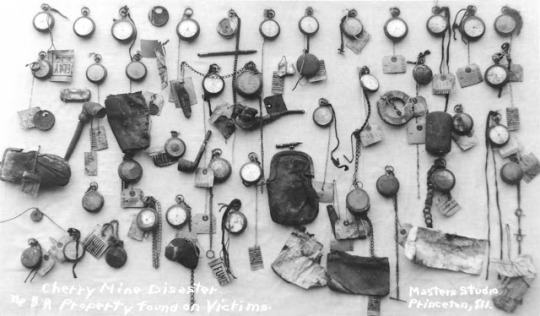
Property of the miners recovered from the mine.
On May 15, 1971 the Illinois Department of Transportation and the Illinois State Historical Society dedicated a monument to the 259 lives lost in the Cherry Mine Disaster. A new monument was placed at Cherry Village Hall at the centennial of the disaster on November 14th 2009. Today the remains of some unidentified victims of the Cherry Mine Disaster lay in a mass grave alongside a memorial statue inside the Miner's Cemetery of Cherry, Illinois.
The Cherry Mine Disaster remains one of the deadliest mining disasters in American history.
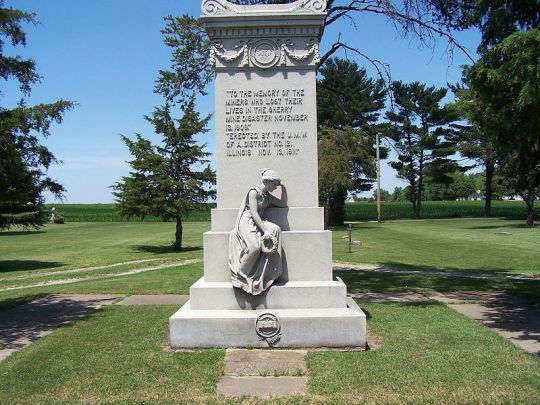
Mass grave memorial stone placed for those lost in the Cherry Mine Disaster.
#HushedUpHistory#featuredarticles#history#mininghistory#industrialhistory#IllinoisHistory#Cherry#CherryMine#CherryMineDisaster#mining#mine#coal mining#coal#tragichistory#historictragedy#miningdisaster#disaster#fire#forgottenhistory#tragedy#Illinois#trapped#miracle#survival#rulechange#defiedtheodds#firehistory#historicfires#deadly#rip
0 notes
Text
DON’T WRONG YOUR BROTHER
Can I pray for you in any way? Send any prayer requests to [email protected].
In Christ, Mark
~~~~~~~~~~~~~~~~~~~~~~~~~~
** Follow The Christian Walk on Twitter @ThChristianWalk
** Like posts and send friend requests to the author of The Christian Walk, Mark Cummings on Facebook at https://www.facebook.com/mark.cummings.733?ref=tn_tnmn
** Become a Follower of The Christian Walk at http://the-christian-walk.blogspot.com
~~~~~~~~~~~~~~~~~~~~~~~~~~
The scriptures. May God bless the reading of His holy word.
“In that day,” declares the Lord, “will I not destroy the wise men of Edom, those of understanding in the mountains of Esau? Your warriors, Teman, will be terrified, and everyone in Esau’s mountains will be cut down in the slaughter.”
“Because of the violence against your brother Jacob, you will be covered with shame; you will be destroyed forever. On the day you stood aloof while strangers carried off his wealth and foreigners entered his gates and cast lots for Jerusalem, you were like one of them. You should not gloat over your brother in the day of his misfortune, nor rejoice over the people of Judah in the day of their destruction, nor boast so much in the day of their trouble. You should not march through the gates of my people in the day of their disaster, nor gloat over them in their calamity in the day of their disaster, nor seize their wealth in the day of their disaster. You should not wait at the crossroads to cut down their fugitives, nor hand over their survivors in the day of their trouble.”
Obadiah 8-14
This ends today’s reading from God's holy word. Thanks be to God.
Do you have any siblings?
I have been blessed with four, three sisters and a brother. We’re a bit spread out in age as I am the oldest followed by the three girls and then my brother who is the youngest and a generation apart from me.
As we’ve grown up through the years, our relationships have run hot and cold as we’ve gone through living this thing called life in our respective ways. Those relationships have not always been what they ought to be and maybe there aren’t many out there that are but there is a way the Lord expects for siblings to relate to one another and we will see a glimpse of His expectation within our verses as we continue to look at the Book of Obadiah.
You’ll remember from yesterday’s message that we don’t know much about Obadiah outside of him probably serving the Lord either during the time of Elisha or Jeremiah, prior to the Lord’s judgment coming upon the northern kingdom of Israel and southern kingdom of Judah. Regardless of the exact time the events of this book took place, what’s important is that Obadiah was given a vision from God about the nation of Edom, a vision that brought bad news regarding coming judgment.
Again, in reviewing what we covered yesterday, the nation of Edom got its name from its founder, Esau, who was born an Israelite, the son of Isaac and Rebekah. After losing his birthright to his younger brother Jacob, Esau bore a grudge and actually wanted to do him harm, later relenting and moving his family south of Israel to the hill country of Seir where he established his own nation bearing the nickname he gained because of the delicious red stew he made (Edom actually means “red”).
Although Esau didn’t go back and renew his grudge with Jacob, the nation of Edom adopted a hostile stance toward the nation of Israel and was a perennial enemy, although the two nations were essentially related. This was something that didn’t sit well with God, especially when Edom stood pat and didn’t show any concern for Israel and Judah as they were attacked by the Assyrians and Babylonians respectively. It wasn’t exactly a brotherly thing to do and we learn more about Edom’s actions and attitudes toward Israel as we look at today’s passage again here:
“In that day,” declares the Lord, “will I not destroy the wise men of Edom, those of understanding in the mountains of Esau? Your warriors, Teman, will be terrified, and everyone in Esau’s mountains will be cut down in the slaughter.”
“Because of the violence against your brother Jacob, you will be covered with shame; you will be destroyed forever. On the day you stood aloof while strangers carried off his wealth and foreigners entered his gates and cast lots for Jerusalem, you were like one of them. You should not gloat over your brother in the day of his misfortune, nor rejoice over the people of Judah in the day of their destruction, nor boast so much in the day of their trouble. You should not march through the gates of my people in the day of their disaster, nor gloat over them in their calamity in the day of their disaster, nor seize their wealth in the day of their disaster. You should not wait at the crossroads to cut down their fugitives, nor hand over their survivors in the day of their trouble.” Obadiah 8-14
We know judgment was coming on Edom. God leaves little doubt about that and He gives us a window of insight into the sins of Edom in relation to the Israelites. They included:
1. Violence against their brother.
“Because of the violence against your brother Jacob, you will be covered with shame; you will be destroyed forever.”
“You should not wait at the crossroads to cut down their fugitives, nor hand over their survivors in the day of their trouble.”
2. Failure to support their brother.
“On the day you stood aloof while strangers carried off his wealth and foreigners entered his gates and cast lots for Jerusalem, you were like one of them.”
3. Rejoicing in their brother’s misfortune.
“You should not gloat over your brother in the day of his misfortune, nor rejoice over the people of Judah in the day of their destruction, nor boast so much in the day of their trouble.”
4. Stealing from their brother.
“You should not march through the gates of my people in the day of their disaster, nor gloat over them in their calamity in the day of their disaster, nor seize their wealth in the day of their disaster.”
All these add up to Edom abusing and neglecting their sibling Israelites and for this, God promised to destroy, terrify, and annihilate the Edomites, a fate just like what befell their brother.
“In that day,” declares the Lord, “will I not destroy the wise men of Edom, those of understanding in the mountains of Esau? Your warriors, Teman, will be terrified, and everyone in Esau’s mountains will be cut down in the slaughter.”
Hopefully, we’re paying close attention to this big word of God from one of the Bible’s smallest books. For God is sending a message, telling us to love our brother (and sister too). If we truly do this in obedience to God’s calling, then we can be assured we won’t be like the Edomites because the Lord will not lead us to invoke violence on our brother, to turn our support away from Him, to rejoice in his misfortune, or steal anything from him. Instead, He will guide us to where we can live with our siblings in the light of the Lord’s love and validate these words from John’s first letter:
Anyone who loves their brother and sister lives in the light, and there is nothing in them to make them stumble. 1 John 2:10
Amen.
In Christ,
Mark
PS: Feel free to leave a comment and please share this with anyone you feel might be blessed by it.
Send any prayer requests to [email protected]
0 notes
Text
Today’s reading from the ancient books of Proverbs and Psalms
for Wednesday, february 24 of 2021 with Proverbs 24 and Psalm 24, accompanied by Psalm 66 for the 66th day of Winter and Psalm 55 for day 55 of the year
[Psalm 24]
A song of David.
The earth and all that’s upon it belong to the Eternal.
The world is His, with every living creature on it.
With seas as foundations and rivers as boundaries,
He shaped the continents, fashioned the earth.
Who can possibly ascend the mountain of the Eternal?
Who can stand before Him in sacred spaces?
Only those whose hands have been washed and hearts made pure,
men and women who are not given to lies or deception.
The Eternal will stand close to them with blessing and mercy at hand,
and the God who redeems will right what has been wrong.
These are the people who chase after Him;
[like Jacob, they look for the face of God].
[pause]
City gates—open wide!
Ancient doors—stand back!
For the glorious King shall soon pass your way.
Who is the glorious King?
The Eternal who is powerful
and mightily equipped for battle.
City gates—open wide!
Ancient doors—stand back!
For the glorious King shall soon pass your way.
Who is the glorious King?
The Eternal, Commander of heaven’s army,
He is the glorious King.
[pause]
The Book of Psalms, Poem 24 (The Voice)
[Psalm 66]
Thank You, Lord
For the Pure and Shining One
A song of awakening
Everyone everywhere, lift up your joyful shout to God!
Sing your songs tuned to his glory!
Tell the world how wonderful he is.
For he’s the awe-inspiring God, great and glorious in power!
We’ve never seen anything like him!
Mighty in miracles, you cause your enemies to tremble.
No wonder they all surrender and bow before you!
All the earth will bow down to worship;
all the earth will sing your glories forever!
Pause in his presence
Everyone will say, “Come and see the incredible things God has done;
it will take your breath away!
He multiplies miracles for his people!”
He made a highway going right through the Red Sea
as the Hebrews passed through on dry ground,
exploding with joyous excitement over the miracles of God.
In his great and mighty power he rules forever,
watching over every movement of every nation.
So beware, rebel lands; he knows how to humble you!
Pause in his presence
Praise God, all you peoples.
Praise him everywhere and let everyone know you love him!
There’s no doubt about it; God holds our lives safely in his hands.
He’s the one who keeps us faithfully following him.
O Lord, we have passed through your fire;
like precious metal made pure,
you’ve proved us, perfected us, and made us holy.
You’ve captured us, ensnared us in your net.
Then, like prisoners, you placed chains around our necks.
You’ve allowed our enemies to prevail against us.
We’ve passed through fire and flood,
yet in the end you always bring us out better than we were before,
saturated with your goodness.
I come before your presence with my sacrifice.
I’ll give you all that I’ve promised, everything I have.
When I was overcome in my anguish,
I promised to give you my sacrifice.
Here it is! All that I said I would offer you is yours.
The best I have to bring, I’ll throw it all into the fire
as the fragrance of my sacrifice ascends unto you.
Pause in his presence
All you lovers of God who want to please him,
come and listen, and I’ll tell you what he did for me.
I cried aloud to him with all my heart and he answered me!
Now my mouth overflows with the highest praise.
Yet if I had closed my eyes to my sin,
the Lord God would have closed his ears to my prayer.
But praises rise to God,
for he paid attention to my prayer and answered my cry to him!
I will forever praise this God who didn’t close his heart when I prayed
and never said no when I asked him for help.
He never once refused to show me his tender love.
The Book of Psalms, Poem 66 (The Passion Translation)
[Psalm 55]
For the worship leader. A contemplative song of David accompanied by strings.
Hear me, O God.
Tune Your ear to my plea,
and do not turn Your face from my prayer.
Give me Your attention.
Answer these sighs of sorrow;
my troubles have made me restless—I groan from anxiety
All because of my enemy! Because his voice speaks against me,
his wickedness torments me!
He casts down misfortune upon me;
his anger flares; his grudges grow against me.
My heart seizes within my chest; I am in anguish!
I am terrified my life could end on any breath.
I shiver and shudder in fear;
I can’t stop because this horror is just too much.
I said, “If only my arms were wings like the dove’s!
I would fly away from here and find rest—
Yes, I would venture far
and weave a nest in the wilderness.
[pause]
“I would rush to take refuge
away from the violent storm and pounding winds.”
Throw them off, O Lord. Confuse their speech, and frustrate their plans,
for violence and contention are building within the city.
I can see it with my own eyes.
They plot day and night, scurrying the city walls like rats,
trouble and evil lurking everywhere.
In the heart of the city, destruction awaits.
Oppression and lies swarm the streets,
and they will not take leave; no, they will not go.
If it were just an enemy sneering at me,
I could take it.
If it were just someone who has always hated me, treating me like dirt,
I’d simply hide away.
But it is you! A man like me,
my old friend, my companion.
We enjoyed sweet conversation,
walking together in the house of God among the pressing crowds.
Let death sneak up on them,
swallow them alive into the pit of death.
Why? Because evil stirs in their homes; evil is all around them.
But I, I shall call upon God,
and by His word, the Eternal shall save me.
Evening, morning, and noon I will plead;
I will grumble and moan before Him
until He hears my voice.
And He will rescue my soul, untouched,
plucked safely from the battle,
despite the many who are warring against me.
God, enthroned from ancient times through eternity,
will hear my prayers and strike them down.
[pause]
For they have refused change;
they supply their every need and have no fear of God.
My friend has become a foe, breaking faith, tearing down peace.
He’s betrayed our covenant.
Oh, how his pleasant voice is smoother than butter,
while his heart is enchanted by war.
Oh, how his words are smoother than oil,
and yet each is a sword drawn in his hand.
Cast your troubles upon the Eternal;
His care is unceasing!
He will not allow
His righteous to be shaken.
But You, O God, You will drive them
into the lowest pit—
Violent, lying people
won’t live beyond their middle years.
But I place my trust in You.
The Book of Psalms, Poem 55 (The Voice)
[Proverbs 24]
Don’t envy the wealth of the wicked or crave their company.
For they’re obsessed with causing trouble
and their conversations are corrupt.
Wise people are builders—
they build families, businesses, communities.
And through intelligence and insight
their enterprises are established and endure.
Because of their skilled leadership
the hearts of people are filled with the treasures of wisdom
and the pleasures of spiritual wealth.
Wisdom can make anyone into a mighty warrior,
and revelation-knowledge increases strength.
Wise strategy is necessary to wage war,
and with many astute advisers
you’ll see the path to victory more clearly.
Wisdom is a treasure too lofty for a quarreling fool—
he’ll have nothing to say when leaders gather together.
There is one who makes plans to do evil—
Master Schemer is his name.
If you plan to do evil, it’s as wrong as doing it.
And everyone detests a troublemaker.
If you faint when under pressure,
you have need of courage.
Go and rescue the perishing! Be their savior!
Why would you stand back and watch them stagger to their death?
And why would you say, “But it’s none of my business”?
The one who knows you completely and judges your every motive
is also the keeper of souls—and not just yours!
He sees through your excuses and holds you responsible
for failing to help those whose lives are threatened.
Revelation-knowledge is a delicacy,
sweet like flowing honey that melts in your mouth.
Eat as much of it as you can, my friend!
For then you will perceive what is true wisdom,
your future will be bright,
and this hope living within will never disappoint you.
Listen up, you wicked, irreverent ones—
don’t harass the lovers of God
and don’t invade their resting place.
For the lovers of God may suffer adversity
and stumble seven times,
but they will continue to rise over and over again.
But the unrighteous are brought down by just one calamity
and will never be able to rise again.
Never gloat when your enemy meets disaster
and don’t be quick to rejoice if he falls.
For the Lord, who sees your heart,
will be displeased with you and will pity your foe.
Don’t be angrily offended over evildoers or be agitated by them.
For the wicked have no life and no future—
their light of life will die out.
My child, stand in awe of the Lord Jehovah!
Give counsel to others,
but don’t mingle with those who are rebellious.
For sudden destruction will fall upon them
and their lives will be ruined in a moment.
And who knows what retribution they will face!
[Revelation from the Wise]
Those enlightened with wisdom have spoken these proverbs:
Judgment must be impartial,
for it is always wrong to be swayed by a person’s status.
If you say to the guilty, “You are innocent,”
the nation will curse you and the people will revile you.
But when you convict the guilty,
the people will thank you and reward you with favor.
Speaking honestly is a sign of true friendship.
Go ahead, build your career and give yourself to your work.
But if you put me first, you’ll see your family built up!
Why would you be a false accuser and slander with your words?
Don’t ever spitefully say, “I’ll get even with him!
I’ll do to him what he did to me!”
One day I passed by the field of a lazy man
and I noticed the vineyards of a slacker.
I observed nothing but thorns, weeds, and broken-down walls.
So I considered their lack of wisdom,
and I pondered the lessons I could learn from this:
Professional work habits prevent poverty from becoming
your permanent business partner. And:
If you put off until tomorrow the work you could do today,
tomorrow never seems to come.
The Book of Proverbs, Chapter 24 (The Passion Translation)
0 notes